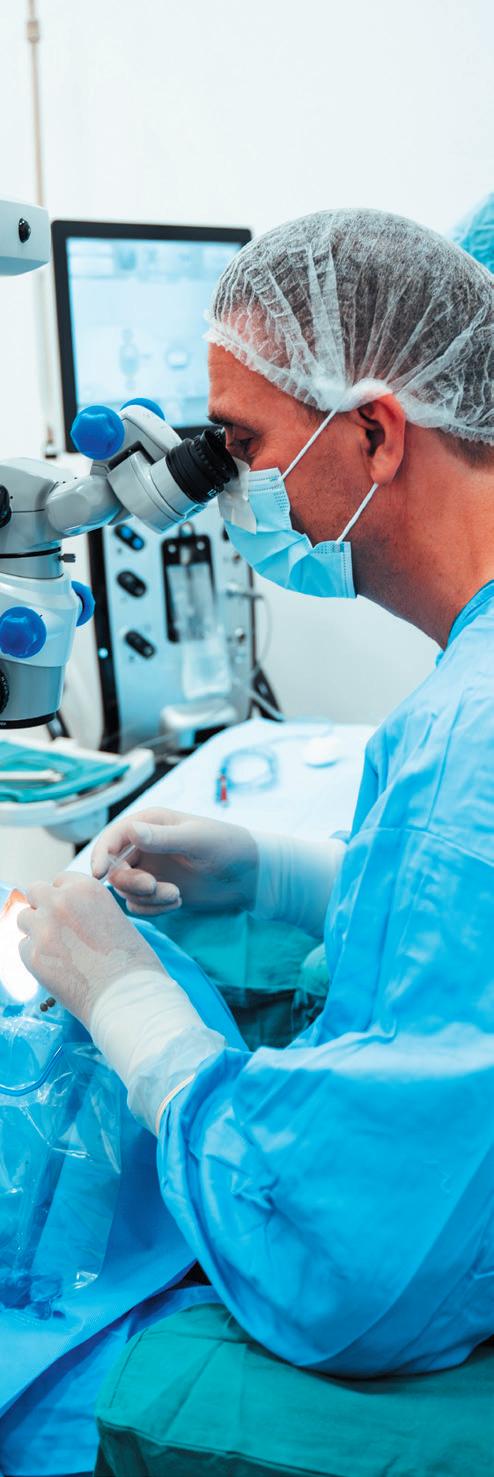






SEVENTH EDITION

Published by Senate Publishing www.senatepublishing.co.uk | +44 (0) 20 7723 9825 | info@senatepublishing.co.uk
Chairman Lord David Evans | Chief executive Caroline Minshell | Editorial director Barry Davies
Printed by Tawseel | Cover image credits: Shutterstock
© 2025. The entire contents of this publication are protected by copyright. All rights reserved. No part of this publication may be reproduced, stored in a retrieval system, or transmitted in any form or by any means: electronic, mechanical, photocopying, recording or otherwise, without the prior permission of the publisher. The views and opinions expressed by independent authors and contributors in this publication are provided in the writers’ personal capacities and are their sole responsibility. Their publication does not imply that they represent the views or opinions of Senate Publishing and must neither be regarded as constituting advice on any matter whatsoever, nor be interpreted as such. The reproduction of advertisements in this publication does not in any way imply endorsement by Senate Publishing of products or services referred to therein.




London is taking advantage of the new technologies that are transforming medicine, continuing the city's long-established reputation for healthcare innovation
Once again, it is my great pleasure to welcome you to another edition of Healthcare in London – the seventh time that we have brought you this publication highlighting the UK capital’s world-class private healthcare services.
London’s history as a hub for medical advancement has long been a reassuring factor for patients planning a visit to one of its renowned hospitals and clinics. This spirit of innovation continues to propel the city’s healthcare providers forward as we enter a new and exciting era of medical technology, in particular the introduction of artificial intelligence (AI).
We hear from HCA Healthcare UK on how it is providing the very latest treatments and medical technologies to patients, and we also discover how
its medical concierge service, which enables round-the-clock access to world-leading healthcare in the UK, has already assisted patients in more than 70 countries. From Cromwell Hospital, we also learn how it is focusing on innovation to deliver cuttingedge services for patients, including employing the latest technology and techniques to revolutionise heart care.
The importance of preventative healthcare is highlighted by OneWelbeck, which showcases its world-class diagnostic screening services, designed to detect early signs of disease. Private specialist clinic London Medical, part of Bupa, explains the breadth of its outpatient services, while The London Clinic explains how its collaborative team of experts diagnoses and treats complex kidney
conditions. Also, one of the Clinic’s consultant surgeons talks about the endocrine system and the treatments available when problems occur.
Our regular focus on cancer care begins with The Royal Marsden – one of the world’s leading specialist cancer centres – which highlights its advances in diagnostics, treatment and research, as well as its award-winning private care services. We also learn from one of The Royal Marsden’s consultant medical oncologists about developments in genomic testing, which is enabling personalised, targeted treatments for cancer. Plus The London Clinic profiles the Lung Group, a collaborative initiative dedicated to providing state-of-the-art care for lung cancer, mesothelioma, thymoma, and thymic cancers.
Specific healthcare for men and women comes under the spotlight as Cromwell Hospital explains its wide range of services. Plus two of OneWelbeck’s leading consultants talk about the hospital’s innovative Urology and Men’s Health Centre.
Diabetes care is addressed by London Medical, whose expert team provides the latest in personalised care for prediabetes, type 1 and type 2 diabetes, and obesity. Also, one of The London Clinic’s leading orthopaedic surgeons explains how he and his colleagues assist patients with diabetes-related ankle, foot and lower-limb complications.
The future of healthcare and the adoption of AI technologies across all aspects of the patient journey is explored in detail by IT and software company Globant. Its two fascinating articles examine, in turn, the potential for London’s healthcare sector to harness the opportunities afforded by AI and the strides that Globant is already making in transforming healthcare with its partners.
Finally, as ever, we look at some of the many attractions that can be enjoyed in and around the capital in our dedicated Experience London section. The city’s museums and art galleries are an excellent way to enhance your historical and artistic knowledge, while we also

focus on the British Social Season – the annual sporting and cultural calendar that offers a chance to experience world-class events and occasions in style while enjoying the best in hospitality.
I feel sure that regular readers of Healthcare in London will agree that the UK capital’s already impressive private healthcare package is going from strength to strength, as the benefits of new technology add to the city’s world-class facilities and expertise. We all hope to remain in good health, but when the time comes for diagnosis or treatment, there really is no better place to visit than London.
London is a global leader in developing medical technology that will have positive outcomes for healthcare worldwide (IMAGE: RAKER/SHUTTERSTOCK)

David Hare, Chief Executive, Independent Healthcare Providers Network, NHS Confederation
London’s leading private hospitals and clinics are working together in promoting premium private healthcare on a global stage
As a global city, London leads the way in providing high-quality, complex care to those in need, delivering stateof-the-art healthcare and excellent outcomes to large volumes of patients every year. From innovative therapies via cutting-edge cancer treatments to complex orthopaedics, whatever patients need in terms of treatment can be found in London’s private hospitals, within a densely populated and well-networked environment, allowing all patients access to the best expertise the capital has to offer.
London’s private healthcare providers also continue to invest in the best of new treatments and technologies, using their expertise in research, clinical
trials and education to support the introduction of new therapies and services, not least through the use of artificial intelligence (AI), telehealth and multidisciplinary working to provide the wraparound insight and care that patients expect. Annually, more than 100,000 individuals based abroad choose London as their preferred destination for medical treatment –a number that is rising year on year.
In 2023, a collaborative group of leading private healthcare providers, including NHS teaching hospitals with private patient units, came together to form Healthcare London to open up access for international patients to the high-quality treatment that London has to offer.

Since its foundation, Healthcare London’s collaborative partners have continued to grow in number and now include: Chelsea and Westminster Hospital Private Care (NHS unit); Circle Health Group; Cleveland Clinic London; Cromwell Hospital; HCA Healthcare UK; Imperial College Healthcare Private Care (NHS unit); King Edward VII's Hospital; London Psychiatry Clinic; Phoenix Hospital Group; the Priory Group; Proton International London; The London Clinic; and University College London Hospitals Private Healthcare (NHS unit).
The purpose of Healthcare London is to enable access to world-leading models of healthcare in the capital to provide outstanding outcomes. As such, Healthcare London acts as the coordinating and promotional body to help people who are seeking
best and safest healthcare in the city's centres of excellence, benefiting from multidisciplinary, value-based, coordinated care services.
This year, Healthcare London has continued to develop relationships with key Gulf Cooperation Council (GCC) audiences, hosting a trade delegation, supported by the Department for Business and Trade, to the region in May 2025. This event showcased the complexity of care that partner organisations provide, and reinforced London’s position as a key destination of choice for international patients seeking to advance their complex medical needs
To find out more about Healthcare London, visit www.ihpn.org.uk/ healthcare-london or email healthcarelondon@ihpn.org.uk
Since arriving in the United Kingdom in the 1990s, HCA Healthcare UK has been at the forefront when it comes to adopting new medical technologies, offering patients the latest innovative treatments available in market across a range of medical specialties
When HCA Healthcare came to the UK in the 1990s, we did so to do something not being done in the independent sector – establish hospitals with a deep clinical infrastructure and governance to provide the most complex care otherwise unavailable outside of the UK's National Health Service (NHS). Today, we still have that point of difference, providing levels of complex care on a scale not matched in the sector and with nearly three decades of experience in the UK to guide us.
Our reputation for high-quality care and proximity to world-renowned NHS teaching hospitals has enabled us to partner with consultants across London, Manchester and Birmingham, each with established reputations as leaders in their field of medicine.
We actively embrace innovation and are early adopters of new medicine and technology for the benefit of our patients. In 2024, we received the ‘Innovation with a patient focus award' from Private Healthcare Information Network (PHIN), cementing our status as the hospital network that has provided both the most and widest range of roboticassisted procedures in the UK – more than 16,000 to date. Read on to learn about how we’re shaping the future of healthcare through innovation.
One year on from HCA UK becoming the first independent hospital provider in Europe to introduce Ion™ robotic-assisted technology, we
have supported over 100 patients with access to an innovation that can diagnose lung cancer earlier.
The combination of Intuitive's state-ofthe-art technology and the expertise of the London Bridge Hospital team in consultant thoracic surgeon Mr Tom Routledge and consultant respiratory physician Professor George Santis, has enabled previously unreachable lung nodules to be biopsied. If lung cancer is found to be present then patients can begin treatment plans sooner.
“Suspected lung cancer cases can mean a period of ‘watchful waiting’, leading to increased worry for patients,” explains Mr Routledge.
“Ion™ allows us to reach areas of the lung that have previously been hard to reach, which is both clinically game-changing and transformative for patient wellbeing.”
In March 2024, HCA UK became the first provider in the UK to offer patients access to da Vinci Single Port (SP) technology, making complex surgery possible through one single, small incision. By further reducing the post-operative discomfort of creating surgical wounds, and enabling patients to benefit from robotic-assisted surgery for whom it otherwise may not have been suitable (for example, those with lots of scar tissue from previous operations, or those who are unable to have multiple incisions), the da Vinci SP system has the potential to be transformative for patients.
Launched at London Bridge Hospital by consultant urological surgeons
Mr Ben Challacombe, Professor Christopher Eden, Mr Declan Cahill and Mr Rajesh Nair, this procedure has been extended to patients requiring thoracic surgery – another first for HCA UK. The novel surgical approach, led by Mr Routledge, allows patients –typically those living with lung cancer – to quickly return to daily life with minimal discomfort. “We are proud to be among the first in Europe to offer this option,” says Mr Routledge, “which reflects the depth and breadth of our experience in robotic thoracic surgery.”
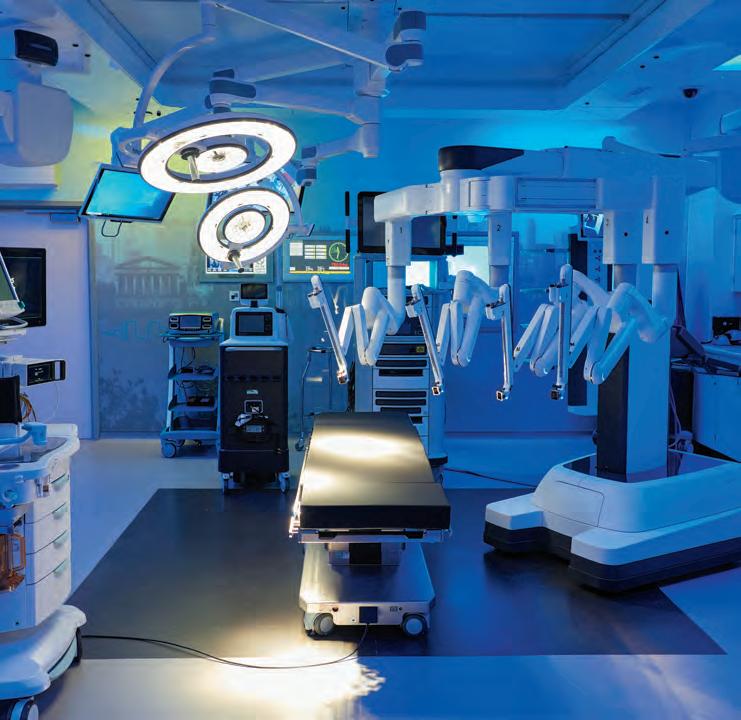
A new hope for people living with sickle cell disease and beta thalassemia
HCA UK is proud to be the first private healthcare provider in the country, outside of clinical trials, to offer pioneering gene-edited therapy for sickle cell disease and beta thalassemia. This treatment is now available at HCA UK at University College Hospital and will be delivered under the expert care of Dr Panagiotis Kottaridis, medical director and consultant haematologist.
Sickle cell disease and beta thalassemia are genetic conditions that impact the production of haemoglobin in red blood cells, the protein responsible for carrying oxygen around the body. Gene-edited therapy works by repairing the abnormal gene so that the body can create healthy red blood cells.
First, the stem cells are collected from the patient’s blood in a procedure called apheresis. Molecular scissors are then used to precisely cut the DNA at a specific point, harnessing the

1-2 HCA is a leader in adopting cuttingedge surgery techniques, providing more robotic-assisted procedures than any other hospital network in the UK (PHOTOS: HCA UK)

natural DNA repair process to modify the gene. These are then re-infused to the patient following a course of conditioning chemotherapy, in a process that mirrors a stem cell transplant, and will populate the bone marrow, producing healthy blood cells.
A ground-breaking treatment for myeloma
For more information about HCA UK, scan the QR code:

Or call the team today: +44 (0)20 4525 2530
Myeloma affects 180,000 people around the world each year. Currently incurable, it develops in plasma cells that are made in the bone marrow and form part of the immune system, causing abnormal proteins that can damage the body.
HCA UK is proud to be at the forefront of innovation by offering chimeric antigen receptor (CAR T-cell) therapy to eligible myeloma patients. As a pioneering immunotherapy developed through cutting-edge research, this treatment harnesses the power of a patient’s own immune system to target and eliminate blood cancer cells. By introducing this breakthrough therapy, HCA UK is helping lead a new era in cancer care.
How the treatment works
A patient’s T-cells – a type of white blood cell that plays a key role in the immune system – are collected from their blood. In a specialised laboratory, the T-cells are genetically engineered to produce chimeric antigen receptors (CARs). These receptors enable the T-cells to recognise and attack specific proteins found on the surface of cancer cells. Multiplied in large quantities, these re-engineered T-cells are then infused back into the patient’s bloodstream, where they seek out and destroy cancer cells. Once in the body, the CAR T-cells identify and bind to the cancer cells, triggering an immune response to eliminate them.
“CAR T-cell therapy is a significant breakthrough in blood cancer treatment,” explains Professor Ashutosh Wechalekar, consultant haematologist at HCA UK at University College Hospital. “We’ve seen incredible results using CAR T-cells to treat other blood cancers, lymphoma and leukaemia, and this therapy represents a transformative step forward for myeloma treatment at HCA UK, giving new hope to patients.”






If you or a family member experiences a brain or spinal injury, everything can seem incredibly overwhelming. At The Wellington Hospital’s Neuro Rehab Centre, we provide care that puts patients first, in a home-from-home, supportive environment.
We understand that life-changing events require life-changing treatment. We’ve helped thousands of people through traumatic times, delivering fully personalised care that helps patients get back to as full a life as possible.
• 25+ years’ experience treating 2,000+ patients of all ages
• Multidisciplinary team of world-class consultants specialising in neurology, rehabilitation medicine, neuropsychiatry and other specialties
• State-of-the-art facilities with innovative treatments and technologies
• Highly intensive therapy programmes with 1:1 and group sessions
• Comprehensive care from acute treatment to long-term recovery
• Specialised programmes for stroke recovery, prolonged disorders of consciousness (PDOC) and spinal cord injury









We o er specialist neurological assessments and fully tailored programmes with a range of therapies on o er including:
• Physiotherapy
• Speech and language therapy
• Neuropsychology
• Occupational therapy
• Dietetics
• Neurologic music therapy
• Traumatic brain injury
• Stroke rehabilitation





• Functional neurological disorder (FND)



• Spinal injuries










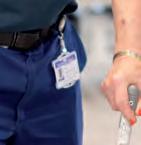













To find out more and to book your free clinical assessment, call us today on +44 (0)20 8131 0584. Your recovery is our priority.












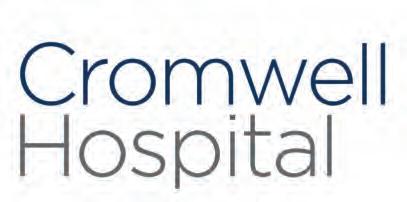
For over four decades, Cromwell Hospital has been leading the way in healthcare, and its services continue to go from strength to strength with the help of the latest technology
From harnessing robotic technology for complex surgical care to deploying ground-breaking radiotherapy treatments, Cromwell Hospital has been innovating and improving how healthcare is delivered for more than 40 years. In 2024, we introduced even more advancements to the way in which we deliver complex care to our patients, including the expansion of several services and the acquisition of the latest, leading-edge technology.
The latest in robotic surgery
We have recently invested in the da Vinci Single Port (SP) robotic surgical system, which will join our existing da Vinci Xi system in providing advanced surgery. The acquisition of the SP system represents a significant step forward in our commitment to providing world-class healthcare through the latest technology.
The SP is an advanced single-port robotic system that enables consultants to carry out delicate and complex surgery through just one single incision. This has many benefits for patients, including a faster recovery period and less pain. At Cromwell Hospital, the SP will initially be utilised for urology, gynaecology and HPB operations.
Mr Amer Raza, a consultant gynaecologist at Cromwell Hospital, who performed the first gynaecology surgery on the da Vinci SP, says: “It is a real honour to be the first consultant in the UK to perform a gynaecology operation on the da Vinci SP. At Cromwell Hospital, we’re committed to improving women’s health, giving them fast access to care and innovative new treatments, and this is further

proof of that commitment. I’ll be using the da Vinci SP for endometriosis and fibroid surgery and hysterectomies.
“The system is designed to perform complex operations through a single incision or natural orifice, making sure it is minimally invasive for patients and leaving less scarring. It also helps surgeons with greater precision and give us more options to suit our patient’s needs.”
Providing world-class care for our patients is important to us, which is why we’re constantly developing our services and facilities. In 2025, we at Cromwell Hospital were delighted to welcome Professor Shaun Preston, a consultant surgeon who recently performed the hospital's first upper gastrointestinal (GI) robotic surgery.
Such surgery treats conditions affecting the upper half of the digestive system, which includes the stomach, small bowel and oesophagus.
Professor Preston has an international reputation in the field of oesophagogastric cancer and complex hiatal surgery. He has a wealth of expertise in robotic, laparoscopic (keyhole) and open surgery, and in endoscopic techniques including interventional endoscopy and endoscopic ultrasound. By expanding our upper GI service to include robotic surgery, alongside Professor Preston’s international expertise, we will be able to support a greater number of patients.
Cromwell Hospital provides one of the UK's largest and most comprehensive private head and neck cancer services.
“Providing world-class care for our patients is important to us”
1 Cromwell Hopsital can offer the latest in robotic surgery techniques, performed by world-leading consultants backed by a dedicated team (PHOTOS: CROMWELL HOSPITAL)
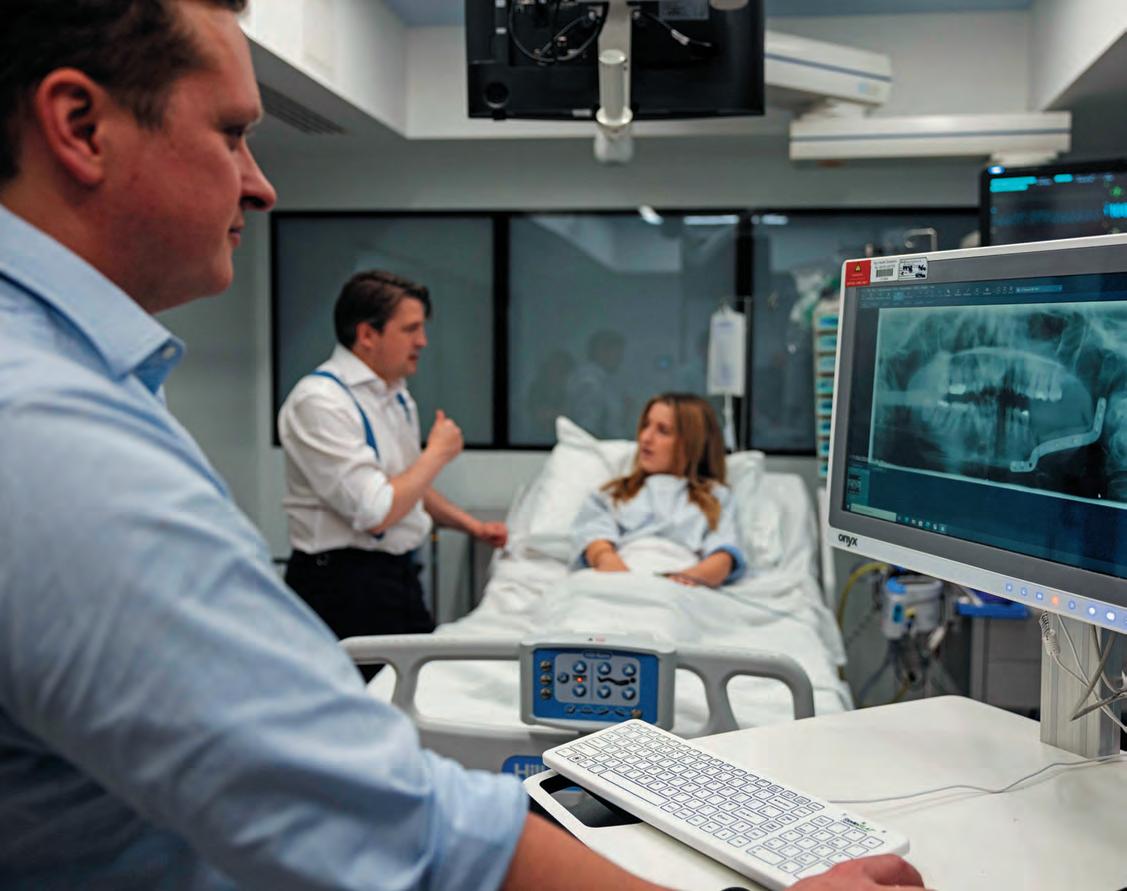
“Patients can be reassured that they will be assessed and diagnosed swiftly”
To accommodate the demand for services, the team has recently moved into a new, dedicated space that will allow them to carry out additional outpatient and dental procedures.
The department has an exceptional track record for success in head and neck cancer surgeries. Having carried out the UK’s largest number of private head and neck surgeries with free flap reconstruction between October 2022 and 2023, the team also achieved a 98% success rate doing so.
Additionally, the team is dedicated to the continuous improvement of their service. In 2023, Diana Norinho, a head and neck clinical nurse specialist, spearheaded a project
to introduce PICO wound healing technology to reduce recovery time for head and neck patients.
Head and neck surgeon Mr Alastair Fry, who leads the department, says: “It was a privilege to support Diana so she could create a trial to improve wound dressings for my patients. It is essential that we continue to support innovation across healthcare for the benefit of patients and staff.”
Rapid access to cancer diagnostics When it comes to cancer, time is of the essence to ensure the best outcomes for patients. Cromwell Hospital proudly provides four pathways to facilitate the rapid investigation and diagnosis of breast, prostate, bowel and gastrointestinal cancers.

Most patients will enter the pathway following a problem identified at a GP appointment and will be able to see a specialist and undergo all the required tests on the same day.
With us, patients can be reassured that they will be assessed and diagnosed swiftly. On our breast pathway in 2023, 97% of patients receive results within four days of undergoing a biopsy, while on our bowel and prostate pathways, 100% of patients were offered treatment within 14 days and 31 days of diagnosis respectively.
Patients who receive a cancer diagnosis are swiftly referred on to our worldleading cancer department, which has been in receipt of a wide range of accreditations and awards. We are proud to have recently been re-accredited by the Macmillan Quality Environment Mark and the Gold Standards Framework Quality Hallmark Award for palliative care.
Sylvia was diagnosed with womb cancer and had a hysterectomy at Cromwell Hospital as part of her
treatment: “It was very good, someone was there to greet me at the door and take me to my room –a room to myself was a real luxury. The care was really attentive, the nurses kept me informed about what was going on and continually checked on me. I stayed in hospital for one night and everyone I dealt with was very positive, pleasant, and knowledgeable.”
The Liver and Renal Centre at Cromwell Hospital offers some of the most advanced treatments available, including selective internal radiation therapy (SIRT).The Centre also provides complex transplantation services for both the liver and kidneys, led by a dedicated transplant team. The service consistently delivers exceptional outcomes for patients: from 202022, the hospital achieved a 100% survival rate one-year post-operation for both donors and recipients.
Additionally, Cromwell Hospital contains one of the largest private dialysis units in the UK, with nine haemodialysis stations, specialist nurses, and a 24-hour on-call consultant.
“We strongly feel it’s essential to continue to support innovations to improve patient care”
To find out more about Cromwell Hospital or to book an appointment, call: +44 (0)20 7244 4886 (self-pay), +44 (0)20 7460 5700 (insurance) or visit: cromwellhospital.com










O ering advanced, personalised screening, OneWelbeck’s Health Assessment and Longevity service harnesses world-class diagnostics to detect early signs of disease
OneWelbeck is London’s most accessible and advanced destination for outstanding healthcare. We provide unrivalled preventative diagnostics and treatment in our state-of-the-art facilities, right in the heart of the capital. Combining advanced technologies with the most recent medical developments, OneWelbeck has developed a unique prevention programme that focuses on early disease detection and proactive health management to help patients lead longer, healthier lives.
Our Health Assessment and Longevity service is an integrated screening service that utilises the expertise of over 300 clinician partners, the latest diagnostic modalities and personalised management plans to provide unparalleled preventive healthcare under one roof.
Health promotion and disease prevention are not just cost-effective, but also mean that one benefits from living a healthier life. Many health conditions can be almost entirely prevented or cured with effective
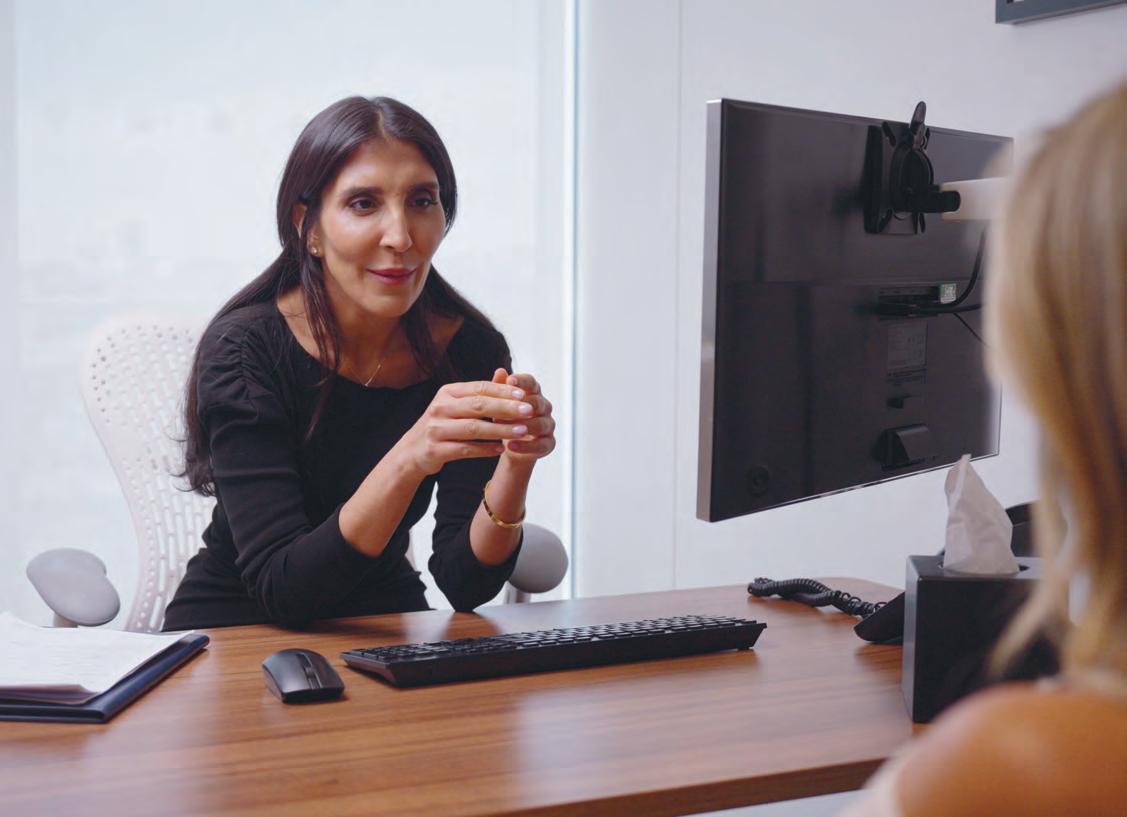
screening and appropriate management. Other conditions, including certain cancers, also have considerably better outcomes and survival rates when identified and treated at an early stage.
1 2
National guidelines, up-to-date clinical evidence and collaborative input from our medical directors across 16 specialities have been paramount in the development of our Health Assessment and Longevity service. By offering all tests within a single facility, and a flexible schedule suited to patient availability, we not only ensure appropriate tests are requested but also arrange prompt follow-up appointments should the need arise.
Each assessment is comprised of a personalised programme of investigations, tailored to an
individual’s health requirements and risk profile, which is planned and developed after an in-depth consultation with a screening doctor.
Our unique ability to provide access to a diverse team of world-leading medical specialists and the availability of comprehensive testing all under the same roof, is what truly sets us apart. We are also proud of our ability to expedite and accommodate urgent specialist reviews on the same day as the assessment, if required.
Recognising that a day of transitioning between tests can be lengthy and tiresome, our Health Assessment and Longevity team has taken additional measures to allow for the most comfortable experience. Each individual is allocated a personal relaxation pod in our executive lounge area, and a dedicated client

1 Patients’ health assessments include an in-depth consultation with a screening doctor / 2 OneWelbeck is located in the heart of London, close to the famous Harley Street medical area (PHOTOS: ONEWELBECK)

“We all aspire to live a long and healthy life, and we have worked hard to get where we are. There are many, often small and incremental, ways we can achieve and extend a healthy lifespan by years, if not decades.
“By investing in the best technological advances, being actively involved in research and continuing to learn and develop, the ethos that resonates here is that the highest-quality patient care is paramount, and prevention is better than cure every single time."
Dr Simrat Marwah, Medical Director, OneWelbeck
liaison manager who facilitates their testing itinerary and chaperones them throughout the building, ensuring they are in the right place and time for each of their scheduled tests.
Individual test results are consolidated by the screening doctor into a comprehensive health report. During a follow-up consultation, the screening doctor will go through the findings of the report with each individual and customise an action plan.
Navigating the various available health packages can be overwhelming, so an initial, comprehensive 60-minute consultation with our experienced screening doctors, including physical and psychological assessment, can be arranged. This ensures a holistic approach to health and wellness and is an excellent
starting point for patients. Following the initial consultation, the Health Assessment and Longevity doctor will develop a plan with the patient to suit their medical needs and achieve optimal health management for their journey.
Genetic testing: Whole Genome Sequencing (WGS) analyses a patient’s entire genome to identify their potential risk of developing certain conditions and diseases. To effectively and sensitively manage the screening, we have partnered with some of the world's leading genetic experts, who provide counsel prior to testing, discuss positive results with patients, review findings as a multidisciplinary team, provide ongoing support and referral channels, and deliver precise and personalised management at an early stage, if required.
GlycanAge: the innovative GlycanAge test allows our Health Assessment and Longevity team to identify whether a patient is at an increased risk of certain health conditions. By measuring chronic inflammation in your system, the test determines biological age, which is directly related to lifestyle. With the results, our team can pinpoint inflammation-causing factors and help patients address and reduce inflammation through often simple lifestyle changes.
GutID microbiome testing: maintaining a healthy gut and promoting overall health requires a balanced composition of microbiome. An imbalance can result in chronic inflammation, a driver of symptoms such as bloating, fatigue and inflammation, and conditions such as irritable bowel syndrome (IBS) and inflammatory bowel disease (IBD). Chronic systemic diseases –such as obesity, diabetes and liver disease – can also arise. Utilising the GutID test and working with leading specialists, we can identify imbalances and improve the biome to restore balance, improve symptoms and reduce the risk of disease development.
Caristo CariHeart: using AI technology, Caristo CaRi-Heart analysis measures the amount of inflammation in the coronary arteries and generates an individualised risk score to aid the diagnosis and management of coronary artery disease. By uncovering hidden inflammation, this test allows us to implement preventative management and treatment plans to lower a patient’s risk of heart attack and other cardiac diseases.
Brain Key: Beginning with a highresolution 3D brain MRI scan, Brain Key provides an AI-driven analysis of a patient’s brain health. The test analyses key biomarkers and brain regions to assess brain health at a biological level to provide a comprehensive assessment of brain age, and also identifies early signs of brain changes that can indicate dementia risk.
TruCheck Intelli: early detection of cancer is critical for better treatment outcomes. Using TruCheck Intelli –a simple, but revolutionary, blood test – we can detect over 70 types of

4
solid organ cancers in patients without symptoms. Currently, the test can detect early signs of cancer in at least 88% of cases, allowing us to provide early treatment to ensure patients achieve the best possible outcomes.
Cardiopulmonary exercise test (CPET): this non-invasive test provides a score known as VO 2 max, which is currently the single best predictor of longevity. As well as assessing a patient’s peak oxygen consumption during exercise to give us a global measure of their current fitness status, the test can also be helpful in the diagnosis and subsequent treatment of conditions such as heart failure and lung diseases.
Sunrise sleep study: sleep is the most important element for health and longevity, but it can be affected by many factors. Utilising the Sunrise sleep test as an initial screening tool, our worldleading respiratory consultants, who specialise in sleep, can detect underlying sleep disorders that can lead to an array of health complications, including heart disease and stroke. The simple test measures jaw movement during sleep and collects the data into a report that is then interpreted by our sleep specialists, who will devise a personalised treatment plan, if necessary.
3 OneWelbeck's facilities include the latest technologies to provide a comprehensive testing service / 4 Dedicated client managers make sure visiting patients have a smooth, relaxed and comfortable experience (PHOTOS: ONEWELBECK)
To learn more about our services or to refer a patient, please call +44 (0)20 3653 2000 or visit onewelbeck.com
Annabelle Neame, HCA Healthcare UK’s vice-president of new markets and innovation, and Bernadette Phelan, head of clinical services at HCA UK's Medical Concierge Centre, talk about how they enable round-theclock access to worldleading healthcare
What is HCA UK’s Medical Concierge Centre and how does it work?
Bernadette Phelan (BP): The medical concierge centre is essentially a single point of contact within HCA UK, and our primary role is to facilitate admissions into the HCA UK network. Our team comprises experienced specialist nurses and patient liaison officers, providing 24/7 support.
One phone number and one email address connect patients and their representatives, such as relatives or doctors, directly to us, ensuring they speak to a person, not a machine, at any hour. We accept referrals from various sources – consultants, clinicians, embassies and GPs – as well as patients themselves.
Our core pillars include bed-to-bed international transfers, adult and paediatric National Health Service (NHS) transfers, acute admissions
and corporate elite screening. In particular, we’ve seen significant growth in NHS transfers, from more than 127 NHS Networks.
We facilitate transfers from across the UK, ensuring quality assurance and patient safety through a robust process: obtaining patient consent for clinical notes, utilising an image exchange portal, allocating a specialist case manager, consultant review and acceptance, insurance authorisation and organising private ambulances for transfers into HCA UK hospitals.
Our patient referrals typically come from international and UK consultants, GPs, embassies, international SOS, large corporations and clients themselves.
We have a substantial international presence, having assisted patients from over 70 countries. The breadth and depth of HCA UK’s offerings –
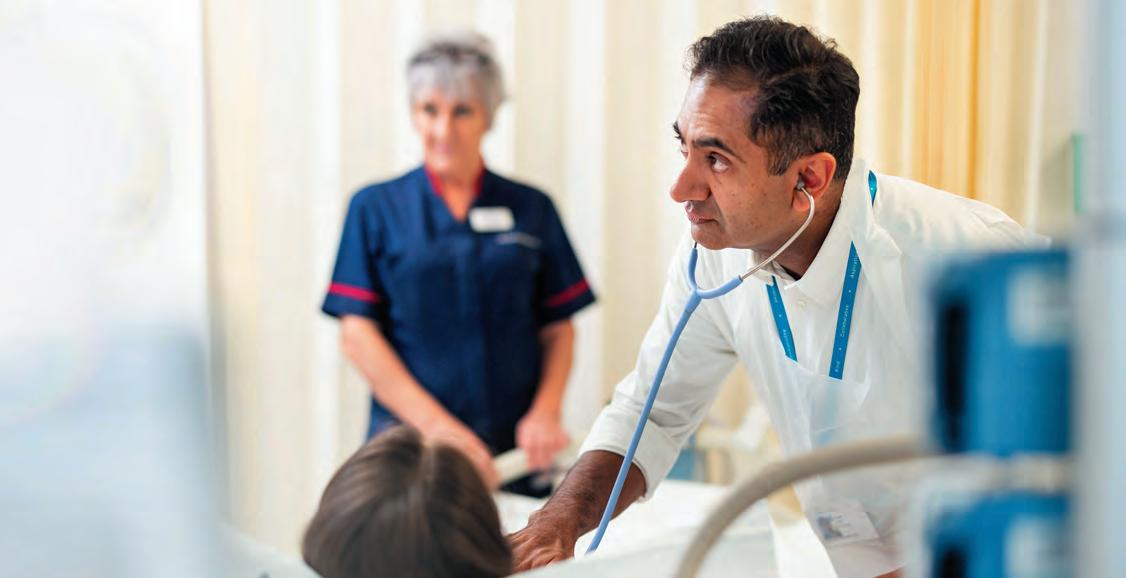
including state-of-the-art equipment, advanced cancer treatments, multidisciplinary teams, genomic testing, robotic surgery and innovative therapies – are crucial. We focus on the patient journey, providing wraparound care that is highly valued, as reflected in our patient feedback.
For acute admissions, our 24/7 service allows GPs to admit patients directly to any one of our Acute Admissions units across London, where care can be expedited, avoiding lengthy waits. Similarly, our corporate and elite screening services are personalised and seamless.
Annabelle Neame (AN): We've established a 24/7 domestic ambulance service and a trusted network of air ambulances, including neonatal intensive care. Internationally, our service is exceptional, particularly when dealing with emergencies such as accidents, strokes or heart attacks. Relatives or consultants often contact us in a state of panic, unsure of what to do. It’s incredibly rewarding to bring someone home safely.
BP: Our international transfer service is comprehensive – we handle everything, from arranging transport
to keeping families informed. The service ranges from intensive care unit transfers to arranging transport for patients with less critical needs. For complex cases, we ensure multidisciplinary collaboration and prioritise the patient's best interests, making sure the patient transfer is both ethically and medically advisable. Our nursing perspective is patientcentric and driven by a commitment to providing the best possible care.
What is the extent of HCA UK’s global network?
AN: Our international network has expanded significantly. Global mobility is increasing and more people than ever have international private medical insurance, enabling them to choose where they receive treatment. We mostly receive domestic privately insured patients, but we also assist self-pay and internationally insured patients, as well as those supported by embassies.
The trend of seeking treatment abroad is growing, with factors influencing this choice including language, visas, governance and expertise. The UK has become one of the world’s most prominent hubs for medical tourism, valued for both its governance and the expertise of its specialists.


1 HCA UK partners with consultants who are leading experts in their fields / 2 Annabelle Neame, HCA UK’s vice-president of new markets and innovation / 3 Bernadette Phelan, head of clinical services at HCA UK's Medical Concierge Centre (PHOTOS: HCA UK)

“We’ve earned the trust of clinicians globally, ensuring patient safety and quality care”
We prioritise patient choice, matching patients with the best subspecialists and most appropriate facilities. Where we cannot provide a particular service, such as inpatient psychiatric care, we have strong third-party referral relationships.
BP: Our reputation for high-quality care and proximity to world-renowned NHS teaching hospitals has enabled us to partner with consultants that have established reputations across the globe as leaders in their field of medicine. We have more than 3,500 consultants, the majority holding posts in the NHS.
A good example of the value of this expertise came with a very complex brain tumour case, where we were able to gain the input of four professors from our HCA UK network who collaborated and helped to develop a treatment plan. It was phenomenal to have access to their collective knowledge and experience.
How would you say the concierge service from HCA UK is different from the competition, not just within the UK but also internationally?
AN: In the UK, we distinguish ourselves by having a network of hospitals with excellent intensive care facilities, enabling us to handle complex cases. Internationally, our strength lies not only in our own network, but also in our relationships with major hospitals worldwide. We've earned the trust of clinicians globally, ensuring patient safety and quality care.
Shared learning experiences and care are also vital. Historically, international patients would need to stay abroad for extended periods, but we’re promoting collaboration between multidisciplinary teams to facilitate shared care. This has been incredibly rewarding.
We also cater for VIPs – from royalty and diplomats to film stars and elite athletes –ensuring discretion and confidentiality.
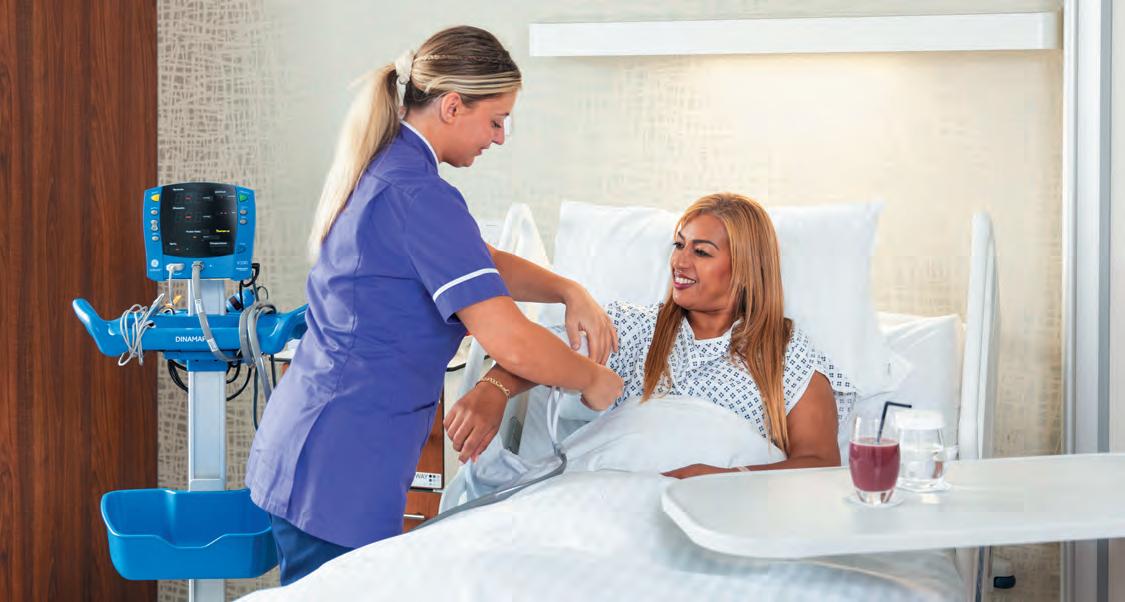
5
We also work closely with organisations dealing with ultra-high-net-worth individuals, understanding their specific needs, particularly regarding privacy.
How do you cater for the different cultures of patients visiting from abroad, such as language, food and customs?
AN: We deeply respect patients’ cultural needs, wherever in the world they are from. Every single member of our staff, from doctors through to our kitchen team, receives cultural awareness training during their corporate induction, so it's something we take seriously.
We also work very closely with a specialist translation company to provide medical notes and other documents in the patient’s own language, as well as offering interpreters who can work with our medical team. Patients from countries where English is a commonly used language – such as India or Nigeria – frequently opt to come to the UK, rather than going to other destinations, due to the language benefits.
On a personal level, what do you most enjoy about your roles in HCA UK’s Medical Concierge Centre?
BP: One of the things I love about our concierge service is that, by
managing the logistical challenges of admissions and keeping things moving, we allow clinicians to focus their attention on patient care.
AN: Speed of service is also very important to people, particularly if they're concerned about a medical issue and want to be seen quickly, but patient safety remains paramount. Ensuring a patient is stable and fit to fly, for instance, requires careful coordination and agreement from multiple parties. It’s very satisfying to bring everything together, particularly when we’re dealing with complex cases.
Our motto is to say ‘yes’ to every request and then find a way to fulfil them, embracing the challenges and working hard to deliver exceptional service. Both Bernie and I come from a nursing background, so we have a keen understanding of the needs and concerns of patients, ensuring they receive world-class care.
BP: I feel immensely proud and honoured to be in this position, and sometimes I pinch myself and think “Do I really have a job like this?”. I love being able to help so many people in this way.
4-5 HCA UK’s network of hospitals ensures that patients from home and abroad can access top-quality healthcare whenever it is required (PHOTOS: HCA UK)
For more information on HCA Healthcare’s UK Medical Concierge Centre:
Visit: www.hcahealthcare.co.uk/ patient-and-visitor-information/ hca-uk-concierge-centre
Email: enquiries.concierge@ hcahealthcare.co.uk
Call: +44 (0)20 3993 1994














Established in the UK capital for more than three decades, London Medical provides an outstanding range of outpatient services care under one roof
London Medical, part of Bupa, is a leading private specialist outpatient clinic in Marylebone. London Medical first opened its doors to patients in 1991, as a specialist diabetes clinic. However, as diabetes affects almost every part of the body, the Centre very quickly started to widen its focus to provide first-class clinical care across the various conditions and problems commonly associated with the disease.
The Centre has built an outstanding reputation for providing care for the whole family, including in the fields of weight management, ophthalmology, cardiology, and endocrinology.
significant new opportunities for us. The Bupa name is well recognised globally as a standard-bearer of high-quality care, enabling us to work with world-renowned doctors and offer our patients access to the very best specialist care.”
As excess weight and diabetes can affect almost every part of the body, London Medical provides access to a wide range of services to provide first-class clinical care across the various conditions and problems commonly associated with the disease.
1
London Medical, part of Bupa In 2024, London Medical was acquired by Bupa Health Services. Dr Ralph Abraham, consultant physician and founder of London Medical, says: “We’re delighted to join Bupa Health Services. Our partnership with Bupa will create
Dr Abraham explains: “We know that patients may be affected by other conditions that are linked to weight and diabetes, which is why it was important to us that London Medical provides patients with access to a wide range of services to help families at all stages of their life.”

1
Recently, London Medical has been investing in outpatient services and facilities to expand its services and provide more care under one roof.
With one in seven women in the UK affected by breast cancer, we understand the importance of having rapid and seamless access to care. That’s why London Medical now provides a one-stop breast clinic, making swift access to care even easier.
Our one-stop clinic enables patients to see a consultant and have all scans, tests and a biopsy (if needed) on the same day – all under one roof. Patients who receive a breast cancer diagnosis will receive fast and seamless access to the Integrated Cancer Campus at Cromwell Hospital, which boasts some of the most advanced treatments and stateof-the-art facilities in London.
We have also expanded our gynaecology provisions, offering expert care and outpatient diagnostic services for a wide range of conditions including menopause, fibroids and endometriosis.
Our new joint allergy and ENT (ear, nose and throat) clinic in London is the first and only clinic of its kind available privately in the UK, providing comprehensive, expert-led care for allergies of all types. All consultations and diagnostics are carried out on-site at London Medical, with skin-prick test results available on the same day.
If their condition requires complex treatment, patients can benefit from the expert opinion of two specialists in allergy and ear, nose, and throat conditions within a joint clinic. While the clinic is for patients aged 13 and over, we also provide a bespoke paediatric allergy service at London Medical.
Providing leading care for patients is central to everything that we do at London Medical, which is why we’re proud to be investing in more services to support our patients. “We want to be here to support patients for their healthcare needs, regardless of whether it is linked to diabetes,” says Dr Abraham. “Expanding services at London Medical means we can provide patients with more care under one roof.”
“We want to support patients and their families for all their healthcare needs”
To find out more about London Medical or to book an appointment: Call: +44 (0)800 048 333
Visit: londondiabetes.co.uk
Since its foundation nearly 100 years ago, The London Clinic has combined cutting-edge medical advancements with a deeply rooted commitment to compassionate, patient-centred care
The London Clinic is one of the UK’s largest and most renowned independent hospitals. Celebrated for its multidisciplinary expertise and pioneering approach, the clinic is proud to offer world-class kidney care services, including dialysis, complex transplants, and comprehensive aftercare programmes.
The London Clinic’s philosophy centres on treating every patient as an individual, ensuring their journey is as smooth and stress-free as possible. With an impressive legacy of medical innovation and a tradition of excellence, the clinic is uniquely positioned to deliver unparalleled care to kidney patients from around the globe.
Consultant nephrologist Professor Alan Salama says “For patients with kidney conditions, we know every moment counts. From when a patient is referred and a suitable donor match is confirmed, without any unexpected complications a transplant can generally take place within two months.”
During a patient’s initial consultation, a surgeon and physician will conduct a physical examination and organise tests to assess fitness for surgery, and establish a donor match. The London Clinic is proud to provide a rapid testing service, through its on-site pathology laboratory, which allows a quicker response on whether a suitable donor and patient match can be found. Results of tests and

scans can be reported to the consultant within just 72 hours (depending on speciality and range of tests). As well as blood tests, kidney patients may require: – MRI Scan using advanced 3T MRI technology – Nuclear medicine scans – X-Ray
– Tissue typing (HLA) test to evaluate genetic markers
Patients are then booked in for a pre-operative assessment to assess their condition in more detail, when they are also provided with advice for before and after surgery.
At The London Clinic, providing care for kidney patients is a collaborative endeavour. Within the hospital an experienced group of surgeons and nephrologists covers all aspects of
nephrology, kidney disease and its surgical management (including for rare conditions), chronic and acute dialysis, and transplants.
The clinic’s dedicated multidisciplinary team works together to create personalised treatment plans that blend the latest advancements in medical science with each patient’s unique needs. Multidisciplinary team meetings unite specialists from all relevant fields to contribute to developing treatment plans and providing ongoing care. This integrated approach ensures comprehensive care and leads to better outcomes for patients.
In addition, medical teams work alongside The London Clinic's dedicated and award-winning nursing teams (LaingBuisson





2

1 Kidney patients benefit from a fast turnaround of test and scan results, which are generally available to consultants within 72 hours / 2 Professor Alan Salama, consultant nephrologist at The London Clinic (PHOTOS: THE LONDON CLINIC)


Nursing Team of the Year 2024), who are committed to providing quality care based on patient-centred practice.
The London Clinic is renowned for performing complex kidney transplants – for example, for patients with: unique anatomy due to previous cancers; complex medical problems, including previous incompatible transplants; higher immunological risks due to systemic diseases such as lupus; and other conditions, such as diabetes or cancer.
Patients needing to visit the intensive care unit (ICU) can be assured it has been designed in a manner to support excellent care and recovery for those suffering from critical illnesses or complex surgery, in a clinically conducive environment. The ICU is comprised of 13 single rooms (five with en-suite bathrooms), with a sophisticated airflow system throughout and four isolation rooms to protect patients with compromised immune systems or those who are more vulnerable to infection.
The London Clinic’s Patient Experience feedback continues to demonstrate 95%-100% satisfaction with their treatment across the ICU, with mentions of excellence in staff attitude, descriptions of caring and compassionate staff, and recognition of speciality surgical support and rehabilitation.
As travelling abroad for medical treatment is a significant decision, The London Clinic's goal is to make the journey for international patients as smooth and comfortable as possible. To ensure this, a dedicated international team and healthcare professionals offer comprehensive support throughout the entire healthcare journey, including personalised aftercare for both recipients and donors.
The London Clinic provides a seamless experience – from the moment patients make contact, through to treatment and beyond. Its staff are ready to assist with every detail, from connecting patients with leading nephrology
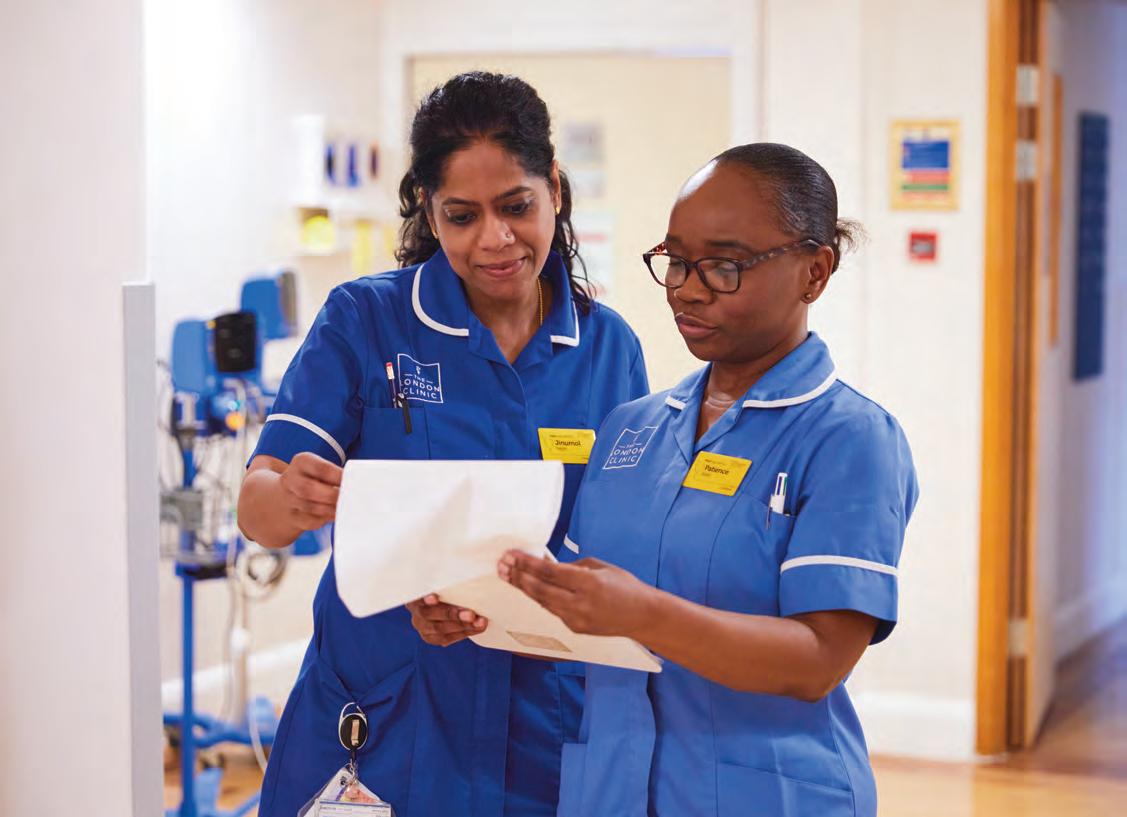
consultants to managing hospital admissions and helping to organise accommodation for patients and their families during your stay in London.
Following treatment, the commitment to patient care continues, with a thorough aftercare plan tailored to individual needs, ensuring continuity of care once a patient returns home. Kidney transplant recipients will generally be in London for around three months, including an inpatient stay of five to seven days, and then follow-up care and tests for a minimum of six weeks.
After returning home, patients have a video check-up with their care nurse about dressings and medications, and to assess overall well-being.
“Ideally patients will return to The London Clinic once a year for a checkup with our specialists,” explains Professor Salama. “Alternatively, you
can be referred to a local specialist who can continue your care closer to home, and we will be able to share your medical records and treatment details to ensure a smooth transition.”
The London Clinic also provides a first-class kidney dialysis service. The self-contained dialysis unit offers a comfortable and private environment, equipped with the latest dialysis machines to ensure optimal treatment outcomes. Under the care of a highly experienced nephrology team, patients receive treatment plans designed to meet their medical and lifestyle requirements.
Whether patients are receiving dialysis as part of ongoing care or as preparation for a kidney transplant, The London Clinic’s care teams are committed to delivering compassionate support and world-class care, every step of the way.
To learn more about The London Clinic, visit thelondonclinic.co.uk or contact: T: +44 (0) 20 4527 8215 E: appointments@ thelondonclinic.co.uk
For international patients, contact: E: internationaloffice@ thelondonclinic.co.uk

Cromwell Hospital combines the expertise of its team with the latest technology to provide cardiac patients with the best standards of care
Based at our state-of-the-art hospital in South Kensington, our Heart and Lung Centre is home to three world-leading departments: cardiology, cardiothoracic surgery and respiratory medicine. The Heart and Lung Centre at Cromwell Hospital provides seamlessly coordinated care from start to finish, encompassing state-of-the-art diagnostics, the very latest treatments and the expertise of our world-class consultants.
With over 40 highly trained cardiologists, we have specialists in areas including electrophysiology, interventional cardiology and congenital heart disorders. We also provide cardiothoracic surgery for patients who need surgical intervention. We have a dedicated intensive care unit that provides oneto-one nursing for those requiring round-the-clock care post-surgery.
Mr Inderpaul Birdi, a consultant cardiac surgeon at Cromwell Hospital, says: “The dedication and expertise of the team of professionals are truly commendable. Their commitment to delivering unparalleled care ensures that our patients receive nothing short of the best.”
Experts in heart rhythm disorders
Atrial fibrillation, often shortened to AFib, is the most common heart rhythm condition in the UK, affecting around 1.4 million people. AFib causes the heart to beat irregularly and, often, abnormally fast.
Having atrial fibrillation can raise the risk of developing heart failure, alongside other heart-related complications, so it is important to see a specialist if you think you may
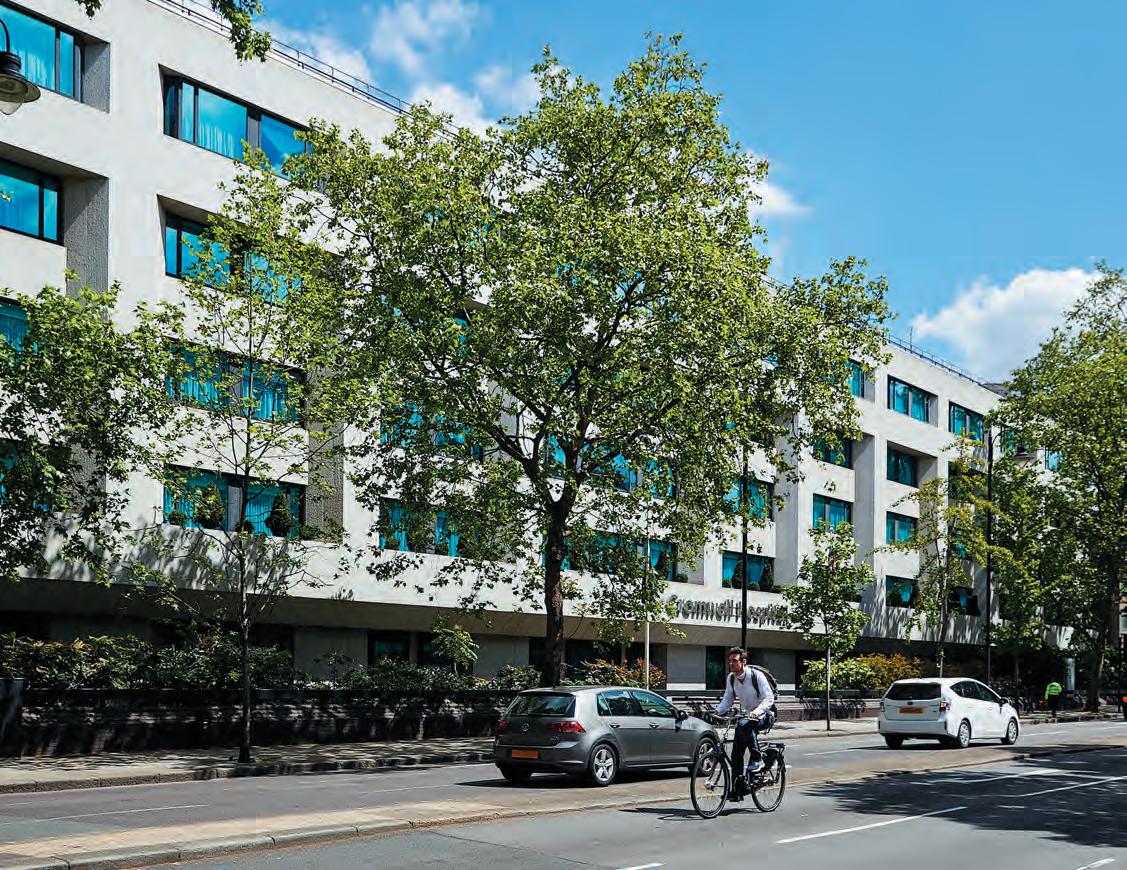
be affected. If you are diagnosed with atrial fibrillation, a cardiologist will work with you to determine the best course of treatment. There are different treatment options available, depending on the severity of your case.
Innovations in AFib treatment
Convergent ablation is an innovative new type of treatment for patients with persistent atrial fibrillation, which involves a combination of two procedures: keyhole surgery and catheter ablation. Ablation is used to destroy tissue inside the heart, while surgery destroys tissue on the outside of the heart.
The surgical portion of the treatment involves using a long, thin device called a pericardioscope, which has a tiny camera and light attached to one end.
This allows the surgeon to effectively see the outside of the heart and enables them to destroy any fibrillationcausing tissues with greater precision. In some cases, during the hybrid ablation procedure, the surgeon may choose to place a special clip or suture on a part of the heart called the left atrial appendage.
Convergent ablation has an 80-90% success rate, which is a 75% increase compared to other approaches.
Dr Syed Ahsan, Consultant Cardiologist at Cromwell Hospital, says: “Convergent ablation is setting the new standard of care for long-standing atrial fibrillation. As well as having a high success rate, it reduces the risk of stroke in patients by 90%, improving quality of life and outcomes and reducing reliance on medications.”

2
1-2 Cromwell Hospital provides leading care for cardiology concerns (PHOTOS: CROMWELL HOSPITAL)
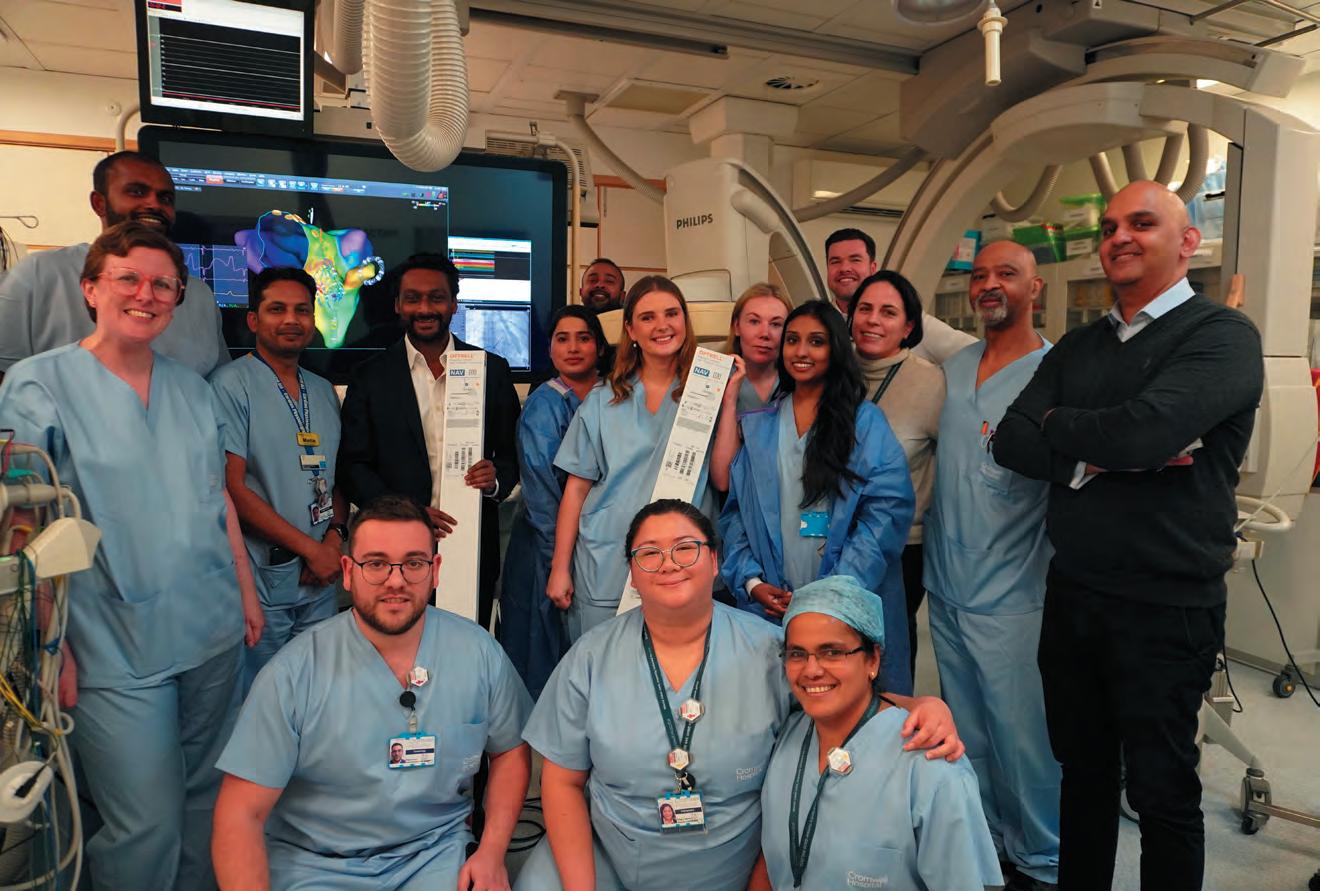
“Over 50% of our recent surgeries were minimally invasive”
Investing in the latest technology
Towards the end of 2024, we performed our first FARAPULSE procedure with consultant cardiologist Dr Zhong Chen. Pulsed field ablation is a new type of catheter ablation. It uses tissueselective, non-thermal electric fields to effectively ablate the heart tissue and avoid damage to surrounding structures. Pulsed field ablation benefits from a shorter procedure time, compared to standard catheter ablation with similar outcomes.
In 12-month clinical trials that directly compared the efficacy and safety of the FARAPULSE system against standard thermal ablation, it was found that FARAPULSE was as safe and effective as conventional thermal ablation, with statistically shorter procedure times. We
were one of the first private UK hospitals to provide pulsed field ablation using FARAPULSE, by Boston Scientific.
From complex heart surgeries, like valve replacement or repair, to innovative convergent AFib ablation, we are one of the few private hospitals in the UK to offer minimally invasive (keyhole) techniques in cardiothoracic surgery –over 50% of our recent surgeries were minimally invasive. In August 2023, we performed the first mini-mitral valve repair at Cromwell Hospital, with the patient making a full recovery; we have since performed 15 mini-mitral surgeries.
We are also one of the top three hospitals in the UK for the shortest post-operative length of stay. Mr Birdi says: “Cromwell Hospital’s leadership
ensures seamless operations and a supportive environment for all clinical and allied professionals, empowering us to provide worldclass care for our patients.”
Sandy’s story
Sandy received treatment at Cromwell Hospital in 2024 after being diagnosed with a serious heart condition. He was diagnosed and treated using minimally invasive surgery within a week by Mr Birdi and his team. Sandy says of his experience: “The staff have been phenomenal. It gave me a little hope that there are good people out there. They care so much, and they’re so dedicated to their job… I tell everyone about my experience, about the week I was here.”
In 2024, we launched a new leadless pacemaker programme (Micra™) for patients with bradycardia, led by consultant cardiologist Professor Tom Wong. Bradycardia is a heart rhythm disorder where the heart beats too slowly, which may cause those affected to feel tired, dizzy and short of breath.
Micra™ is the world’s smallest pacemaker, designed to treat bradycardia. Unlike traditional pacemakers, it leaves no bump under the skin, no chest scar, and requires no lead.
Patients who have Micra™ implanted may benefit from fewer post-implant activity restrictions and medical complications than those with traditional pacemakers. Micra™ can last for up to 18 years, depending on the heart condition and how often the device is delivering therapy.
Patients at Cromwell Hospital will have their Micra™ device placed in a 45- to 60-minute procedure and can go home the same day.
At Cromwell Hospital, we are at the forefront of cardiac care. Our leading team constantly innovates and we are proud to support our multidisciplinary team to provide the very latest cardiac care for the benefit of our patients.

In 2024, we performed our first electrophysiology procedure using the innovative Optrell catheter from Johnson & Johnson MedTech, performed by Dr Syed Ashan and Dr Neil Srinivasan, consultant cardiologists at Cromwell Hospital. The Optrell catheter represents a significant advancement in cardiac care and has the potential for enhancing precision and improving patient outcomes in diagnosing and treating arrhythmias.
We also offer cryo nerve block to eliminate almost all post-operative pain for cardiac patients. Also, in 2024, we introduced the acute coronary syndrome pathway to support patient care.
Mr Birdi says: “The most fulfilling aspect of my job is witnessing the transformation in my patients' lives. Being part of their journey towards better health, and witnessing their gratitude and relief after successful surgeries or treatments, is incredibly rewarding. There is nothing quite like seeing someone regain their vitality and quality of life.” 4
3 Dr Syed Ashan and Dr Neil Srinivasan, consultant cardiologists at Cromwell Hospital, with the team introducing the Optrell catheter / 4 Cromwell Hospital can offer the latest advances in minimally invasive cardiothoracic surgery (PHOTOS: CROMWELL HOSPITAL)
To find out more about cardiac care at Cromwell Hospital or to book an appointment, call: +44 (0)20 7244 4886 (self-pay), +44 (0)20 7460 5700 (insurance) or visit: cromwellhospital.com/ heartandlung
Mr Tom R Kurzawinski, consultant surgeon at
The London Clinic, explains the endocrine system and the treatments available when problems occur
What is your role at The London Clinic?
I am a consultant endocrine and general surgeon, and I have been with The London Clinic for almost 25 years. I perform all my surgeries in adult patients exclusively there, but also operate on children at the Great Ormond Street Hospital. I am also an Honorary Associate Professor at UCL.
What is the endocrine system and its functions, and what types of problems may people experience?
The endocrine system is composed of many endocrine cells, most of which form clusters known as endocrine organs. These include the pituitary and hypothalamus in the brain, which act as the ‘directors of the orchestra’, secreting hormones that regulate other hormones. Further down in the body, we have the thyroid and parathyroid glands in the neck, the
adrenal glands and the pancreas, which also contains endocrine cells responsible for producing hormones like insulin.
Endocrine surgeons operate on organs such as the thyroid, parathyroids, adrenals and parts of the pancreas. The system plays a crucial role in our physiology – essentially, hormones to a great extent define who we are.
What types of conditions do people present with, and how are they diagnosed?
Patients can present in many different ways First, they may have tumours and if they are malignant – for example, thyroid cancer – cancer cells can spread to the lymph nodes and other parts of the body. Palpable or visible nodules in the thyroid or enlarged lymph nodes in the neck are frequently the first presentation of thyroid cancer. Some endocrine tumours can be tiny,
but still create major health issues by overproducing hormones. For example, an overproduction of insulin can lead to dangerously low blood glucose levels, while an adrenal tumour producing too much adrenaline can cause high blood pressure, potentially leading to heart attacks or strokes.
Hormone overproduction disorders can also result in severe metabolic imbalances. For instance, excess cortisol from the adrenal gland can lead to Cushing’s syndrome, while overproduction of aldosterone can cause difficultto-treat high blood pressure.
What is the typical pathway for patients before they come for surgery?
Most patients are referred by their general practitioner (GP), particularly if they present with a lump in the neck. However, the more complex cases typically come from specialised diagnosis by endocrinologists. Also, many international patients come to The London Clinic through direct referrals by their local physicians, especially from the Gulf region, where we have strong medical connections.
Moving on to surgery, what is the process for thyroid, parathyroid and adrenal gland procedures?
Endocrine surgery is highly guided by specialised blood tests and imaging. We measure specific hormone levels, sometimes stimulating or suppressing them for diagnostic purposes. Imaging is equally important. In addition to standard CT and MRI scans, we use nuclear scans with targeted radiotracers to locate tiny tumours.
Each type of surgery is slightly different. With thyroid surgery, patients usually present with a lump, which may be benign or malignant. Surgery is necessary if the lump is cancerous or large enough to cause breathing difficulties.Patients would typically require only an overnight stay in hospital for this kind of surgery.
With parathyroid surgery, patients typically have a benign tumour in one of their four parathyroid glands, causing excess hormone production

that leads to high calcium levels, bone weakening and kidney stones. Imaging and specialised nuclear scans help locate the affected gland before surgery. We also use intraoperative hormone testing during parathyroid surgery to confirm successful removal of the problematic gland within minutes of excision. For such an operation, patients would usually only need to stay in hospital overnight.
Adrenal conditions are complex due to the multiple hormones these glands produce. One of my special interests is aldosterone-secreting tumours, which are often misdiagnosed but can cause high blood pressure that is resistant to standard treatments. Typically, patients stay one or two nights in hospital for their operation, except in cases involving large adrenal cancers requiring more extensive surgery.
What makes The London Clinic unique in endocrine surgery?
We offer state-of-the-art diagnostic and surgical technologies, including intraoperative hormone testing. Our involvement in developing new PET scan tracers for adrenal tumours places us at the forefront of endocrine surgery worldwide.
To learn more about The London Clinic, visit thelondonclinic.co.uk or contact: T: +44 (0) 20 4527 8215 E: appointments@ thelondonclinic.co.uk
For international patients, contact: E: internationaloffice@ thelondonclinic.co.uk
The Royal Marsden NHS Foundation Trust ranks among the world’s leading centres for cancer research, offering unrivalled expertise and standards of care
Rated ‘outstanding’ by the Care Quality Commission (CQC), The Royal Marsden is ranked as one of the leading specialist cancer centres in the world. It operates from two centres – one in Chelsea, London, and one in Sutton, Surrey – as well as its treatment and diagnostic facility, The Royal Marsden Private Care at Cavendish Square, situated in the capital’s world renowned Harley Street Medical Area.
The Royal Marsden is a centre of excellence with an international reputation for ground-breaking research and pioneering the very latest in cancer treatments and technologies. Together with its academic partner, The Institute of Cancer Research, London, The Royal Marsden is one of Europe’s leading cancer centres, with
unrivalled cancer expertise and over 2,500 cancer specialists who cover the rarest and most complex cases. Surgical teams at The Royal Marsden are innovators in their field and the hospital’s radiotherapy department is one of the largest in the UK.
Royal Patronage
His Royal Highness the Prince of Wales has been President of The Royal Marsden since 2007, seeing first-hand on many occasions the world-leading work that we deliver every day for patients and their families. In January we were delighted to announce that Her Royal Highness The Princess of Wales, having been through her own cancer journey and being treated at The Royal Marsden, is now joining him. Together, they will be Joint Patrons of the hospital.
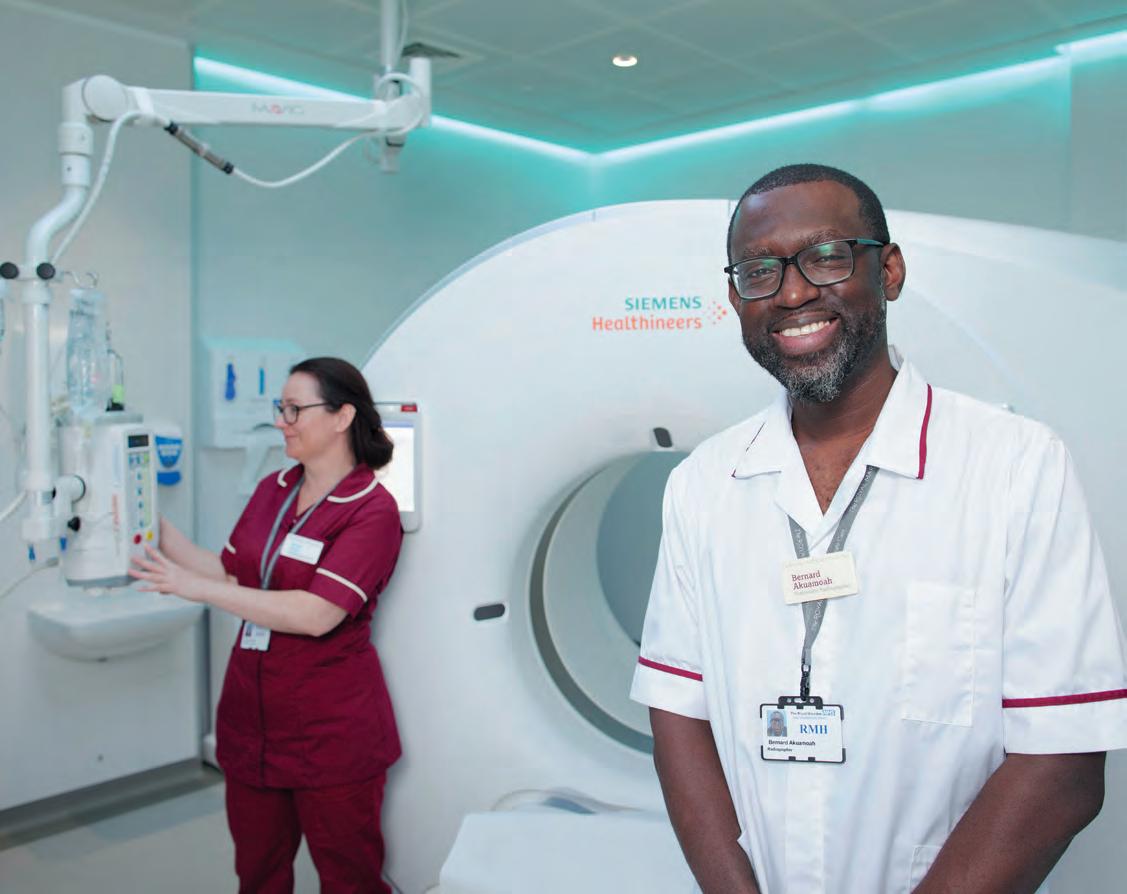
Dame Cally Palmer, chief executive of The Royal Marsden NHS Foundation Trust, said: “We are delighted that Her Royal Highness is now joining His Royal Highness The Prince of Wales in becoming Joint Patrons of our specialist cancer centre. We are incredibly fortunate to receive Royal Patronage – it is inspiring for staff and patients and enables us to shine a light on the outstanding work our staff deliver every day for patients and their families.”
Care like no other
The Royal Marsden Private Care offers an award-winning service, having won the LaingBuisson Best Hospital Award multiple times, most recently in 2024. Private patients are offered a hotel-style service, including a healthy and nutritious food menu, single ensuite rooms and
direct access to their treating consultant. A specialist International Advocate Service ensures that all the needs of overseas patients are met, both culturally and in terms of treatment and care. They work closely with a multinational team of interpreters, including a dedicated Arabic Advocate Service, which can offer one-to-one translations.
Personalised care is at the heart of The Royal Marsden’s approach, and its unique multidisciplinary model ensures that cancer patients receive the highest standards of care. Up to 35 specialists – including surgeons, medical oncologists, radiotherapists, pathologists, nurses and radiologists – attend weekly multidisciplinary team (MDT) meetings to develop personalised treatment plans for each patient.

2
1 The Royal Marsden offers stateof-the-art oncological imaging /
2 The Royal Marsden is one of Europe’s leading cancer centres, with over 2,500 cancer specialists (PHOTOS: THE ROYAL MARSDEN)


The Royal Marsden is continually working to improve early diagnosis for patients to help save more lives –from carrying out pioneering genetic sequencing to identifying mutations that mean an individual has a higher risk of developing cancer, through to regular screenings of those with a genetic predisposition to certain cancers. Our Cancer Genetics Unit offers services to patients of The Royal Marsden and their families who are concerned about a risk of inherited cancer.
From a simple blood sample, liquid biopsies identify the genetic changes in DNA. This innovative technology ensures the cancers of many patients are detected, diagnosed and analysed faster. This service is available for private and clinical trial patients being treated at The Royal Marsden.
Cavendish Square – research-led cancer care in central London
Bringing personalised care to central London, The Royal Marsden Private Care at Cavendish Square offers private patients outstanding facilities, world-class expertise and a rapid diagnostic service. Housed within an Edwardian listed building, this research-led, diagnostic, outpatient and treatment centre is part of The Royal Marsden Private Care’s service provision. One hundred per cent of patients recently rated their care as excellent or very good.
Patients have fast and direct access to world-leading diagnostic and researchactive consultants, who will personally oversee every aspect of their treatment plan. Experts at Cavendish Square specialise in a full range of cancer services across all the main tumour groups, with other clinical specialties offered including genetics, plastic surgery and reconstruction, and pain management. The centre is also home to a minor procedure suite and a medical day unit with bespoke treatment bays, which provide the highest level of patient-focused care for UK and overseas patients who are receiving some of the most advanced cancer treatments.
3 Staff at The Royal Marsden Private Care provide an award-winning standard of service / 4 The Royal Marsden Private Care’s high standards of comfort begin with its luxurious reception area (PHOTOS: THE ROYAL MARSDEN)
The Royal Marsden also offers a stateof-the-art liquid biopsy testing facility for cancer clinical diagnostics and research, with Guardant Health – the first partnership of its kind in the UK. The Marsden360 liquid biopsy test provides comprehensive solid tumour profiling in advanced cancers, allowing clinicians to personalise treatments more accurately.
“Cavendish Square’s modern environment sets a high standard for comfort, innovation and exceptional care,” says Professor Christopher Nutting, medical director of The Royal Marsden. “Private Care Patients from around the world have benefited from the centre’s facilities, safe in the knowledge that everything is underpinned by The Royal Marsden’s world-leading standards of cancer care.”
Earlier this year, The Royal Marsden Private Care opened a brand-new Medical Day Unit (MDU) at its Sutton hospital, bringing world-leading
treatment and personalised care into a beautifully designed space that is tailored to patient comfort and privacy. Designed in collaboration with Royal Marsden clinical teams and shaped by patient feedback, the unit provides a wide range of advanced therapies, including chemotherapy, immunotherapy, targeted therapies and complementary treatments – all delivered by a multidisciplinary team of cancer experts. The first-class care available at The Royal Marsden Private Care in Sutton matches the best care available in central London, but is easily accessible for patients in Surrey and the south-east.
The Trust has an international research reputation, with experts revolutionising the way in which cancer treatment and care is provided, to help extend and improve the lives of people with cancer in the UK and across the world. Experts regularly present at international conferences and are representatives on committees such as the European Society of Medical Oncology and the American Society of Clinical Oncology.
Professor Nicholas Turner, consultant medical oncologist and director of clinical research and development at The Royal Marsden specialises in the treatment of breast cancer. Research led by Professor Turner, showed that a powerful three-drug combination for aggressive advanced breast cancer –inavolisib plus palbociclib and fulvestrant – doubles the length of time before the cancer progresses, compared with a drug combination currently available.
“This is the first study to demonstrate the potential of a therapy combination, which targets the three key aspects of the biology of PIK3CA mutant HRpositive breast cancer,” says Professor Turner. “This new combination helps prevent the cancer becoming resistant to therapy, resulting in more frequent longterm responses and improving survival. We look forward to seeing this treatment option being licensed and becoming the standard of care as quickly as possible.”
Professor Susana Banerjee, consultant medical oncologist at The Royal Marsden, specialises in the treatment
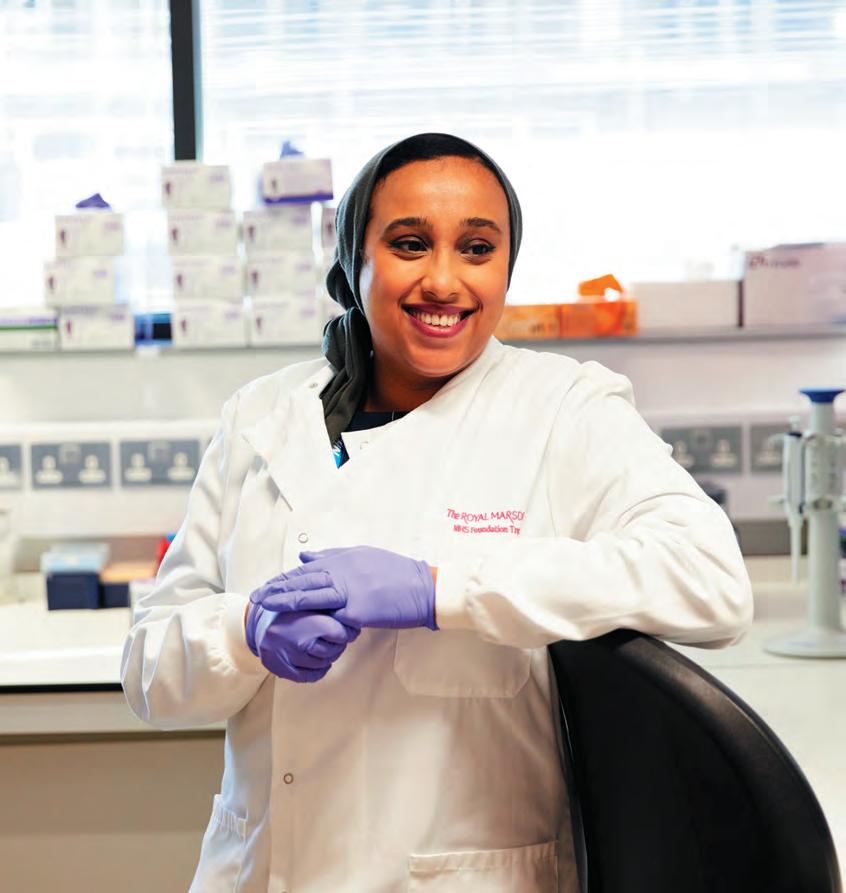
of ovarian, endometrial and cervical cancers. Recent results from the phase two RAMP 201 study, led by Professor Banerjee, showed that a combination of two targeted drugs used to block the growth of cancer cells has a significantly better response rate in patients with a rare form of ovarian cancer than the current conventional treatments.
“These significant results have led to FDA approval of avutometinib and defactinib in the United States,” explains Professor Banerjee. “This is the first approved treatment specifically for recurrent low-grade serous ovarian cancer – a rare, difficult-to-treat cancer. We're now looking to recruit patients globally to our phase three trial and hope results will continue to show better outcomes for patients.”
For more information about The Royal Marsden Private Care or to refer a patient, please:
Visit: www.royalmarsden.nhs.uk/ private
Email: int@rmh.nhs.uk
Call: +44 (0)20 7808 2063
With a proud history spanning 92 years, The London Clinic has long been a beacon of hope and healing in the heart of London’s esteemed medical district, Harley Street
Renowned for its commitment to excellence, The London Clinic stands as a global leader in cancer care, offering cutting-edge diagnostics, treatment, and holistic support to patients worldwide. The clinic’s cancer services are world-class; holding five stars and a rating of excellence from Macmillan Quality Environment, a fully accredited in-house Pathology laboratory, a JAGaccredited Endoscopy unit, a stateof-the-art Intensive Care Unit, and a CHKS-accredited oncology service.
In addition, the clinic has its own stateof-the-art pathology lab, meaning that tests and scans can be conducted and reviewed faster, and the results reported directly to the doctor or consultant within 72 hours of testing (depending on specialty and range of tests).
Located in the vibrant hub of central London, The London Clinic is more than a hospital – it’s a destination for exceptional cancer care. International patients benefit from world-class medical expertise, advanced technologies and a compassionate approach that respects cultural and personal preferences.
The Lung Group: pioneering collaborative care
At the forefront of The London Clinic’s cancer strategy is the Lung Group, a collaborative initiative dedicated to providing state-of-the-art care for lung cancer, mesothelioma, thymoma, and thymic cancers. Combining the clinical expertise of leading thoracic surgeons, pulmonologists, thoracic

oncologists and radiation oncologists, the Lung Group ensures every patient receives a personalised treatment plan tailored to their unique needs.
Dr Dionysios Papadatos-Pastos, a leading lung oncologist with the Lung Group at The London Clinic says, “It is an honour to work with world-renowned experts in a hospital well known for its rich heritage and cutting-edge technology, delivering exceptional care to patients with lung cancer. The London Clinic is committed to advancing healthcare outcomes, and to being equipped to host a patient’s entire health journey in a safe and caring environment.”
At The London Clinic, care is a team effort. Its multidisciplinary team collaborates seamlessly to develop bespoke treatment plans that combine the latest in medical science with the individual needs of each patient. Regular oncology multidisciplinary team meetings, which bring together all relevant disciplines
to input into treatment plans and ongoing management, are key to an integrated care approach that results in improved patient outcomes.
Early detection is crucial in the fight against lung cancer, and the Lung Group’s advanced screening and diagnostic services set the standard for timely and accurate detection. Dr Ricardo Jose, consultant in respiratory medicine with The London Clinic Lung Group, says, “Our comprehensive lung health check programme includes specialist consultations, low-dose CT scans and lung function tests – all completed in one morning – to provide timely reassurance or early detection for optimal respiratory health. Additionally, expert multidisciplinary review ensures that every detail is thoroughly assessed for your peace of mind.”
The London Clinic offers innovative medical treatment, cutting-edge radiation therapy and ground-breaking

1 As well as benefiting from worldclass medical expertise, international patients receive compassionate care that respects cultural and personal preferences / 2 Dr Dionysios Papadatos-Pastos, lung oncologist at The London Clinic Lung Group (PHOTOS: THE LONDON CLINIC)
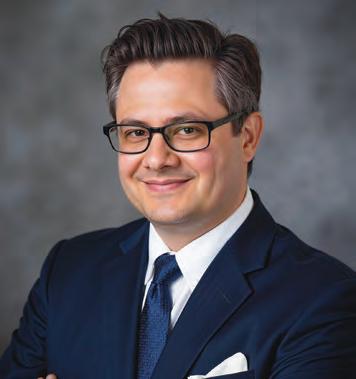
surgical interventions to ensure optimal outcomes. Medical treatments include immunotherapy, to boost the immune system to fight cancer, and targeted therapies that specifically attack genetic changes in cancer cells. Antibody-drug conjugates deliver powerful drugs directly to tumours, minimising harm to healthy tissues.
For patients whose cancer is more contained (oligo-metastatic or oligoprogressive disease), contemporary radiotherapy techniques such as stereotactic body radiotherapy (SBRT) provide precise, high-dose radiation to control tumours, while allowing systemic treatments like immunotherapy or targeted therapies to continue.
In addition, minimally invasive and robotic surgeries for lung cancer offer precision, smaller incisions, faster recovery, reduced pain and fewer complications, ensuring patients can return to daily activities sooner.
The London Clinic offers a fully comprehensive healthcare experience that supports patients right from their
initial appointment through to tests and scans, diagnostics, personalised treatment plans and follow-up support and care. Complementing our expert medical teams are compassionate and skilled nursing staff, recognised most recently as award-winners of LaingBuisson Nursing Team of the Year 2024. The London Clinic’s nursing teams work hand-in-hand with you and your loved ones, creating a supportive environment that fosters healing.
Dedicated clinical nurse specialists further enhance the quality of care by guiding patients through their entire healthcare journey. This includes ensuring patients feel informed and reassured throughout the diagnosis and treatment process, as well as providing support through decision-making around care and follow-up arrangements.
The clinic’s contemporary facilities also offer complementary therapies designed to enhance the treatment journey, promoting both physical and emotional well-being. Once a treatment plan is in place, patients are offered personalised support, which could include complementary therapy-based treatments such as talking therapies (with

4

5
specialised psychologists), physiotherapy (including aquatic rehabilitation, clinical Pilates and pelvic health), dietetics, osteopathy, health and well-being therapies and occupational therapy.
The clinic’s commitment to topquality, patient-centric care includes a welcoming and helpful concierge service and a 24/7 support phone line for any follow-up questions and concerns. The catering team, guided by expert dieticians, offers healthy and tasty dishes from a menu designed for recovery.
Understanding the unique needs of international patients, The London Clinic provides a robust advocacy team to assist with every aspect of the journey. Whether its finding the right consultants, booking medical appointments, organising admission, arranging comfortable accommodation and coordinating translation services, our team ensures a seamless and stress-free experience.
The hospital has recently implemented Pocket Talk®, a cutting-edge translation device designed for everyday use in situations where patients may face
language barriers and where traditional translation services are unavailable. This technology is particularly valuable in settings such as the anaesthetic room or on hospital wards, enabling seamless communication and ensuring optimal care delivery for all patients, regardless of language proficiency.
The London Clinic’s payment options are designed to make treatment more accessible, with self-pay pathways including all-inclusive packages, 0% finance and tailored payment plans, or payment can be made through private medical insurance.
Since 1932, The London Clinic has provided thousands of patients with the very best treatments and care, and given vital support to their families too. If you or a loved one are seeking unparalleled care for lung cancer or related conditions, The London Clinic invites you to join its legacy of hope and healing. With a commitment to innovation, compassion and excellence, the clinic is here to guide you every step of the way on your journey to recovery.
5 The clinic’s contemporary surroundings provide a welcoming and comfortable environment for patients (PHOTO: THE LONDON CLINIC)
To learn more about The London Clinic, visit thelondonclinic.co.uk or contact: T: +44 (0) 20 4527 8215 E: appointments@ thelondonclinic.co.uk
For international patients, contact: E: internationaloffice@ thelondonclinic.co.uk
Dr Angela George, consultant medical oncologist at The Royal Marsden, talks about how her work improves the detection, treatment and prevention of cancer
At The Royal Marsden I perform two roles: I'm a medical oncologist in gynecological cancers, but I also have an additional speciality in cancer genomics – the study of the genetic make-up of cancers. I carry out testing for inherited cancers and I also do a lot of work in molecular testing of tumours, to help inform treatment options for patients and work out a personalised programme for each of them. As clinical director of genomics at The Royal Marsden, I also oversee research programmes and innovation in molecular testing, early diagnosis and getting patients onto treatment as soon as possible.
Genomic testing examines the DNA of cancer cells to find out what is making the cancer grow. Our
genomics laboratories at The Royal Marsden are superb – we provide cancer diagnostic and genomic testing for a large part of the UK and a number of other countries, which send their samples to us for testing.
We’re currently the only laboratory in the UK that is accredited to carry out circulating tumour DNA (ctDNA) testing, also referred to as a liquid biopsy, which analyses DNA fragments released by cancer cells into the bloodstream. This involves taking a blood sample, rather than having to perform a biopsy of a tumour site, which is a lot more pleasant for the patient. We have also developed our own in-house RNA-DNA panels, Ribonucleic acid (abbreviated as RNA) is a nucleic acid present in all living cells that has structural similarities

to DNA. These panels are very comprehensive, so if any new genes become relevant for a tumour type that haven’t previously been assessed, we can update our information very quickly.
In oncology today, we’re moving from treatment based on the type of cancer that a patient has to a much more personalised service, where we consider specific information from a patient’s tumour to decide the best treatment for them. In a very short time, we’ve reached a point where there’s almost no type of cancer in which genomics doesn’t play a role, whether that’s in accurate diagnosis, informing prognosis or selecting the most appropriate treatment with the least chance of toxicity for the patient.
To give patients the maximum benefit from treatment, we locate the mutations that have caused the cancer and affect
how it behaves. We look for a way to block these – it’s like looking for the switch that turned the cancer on and trying to turn it back off again.
If you look at the progress we’ve made in cancer treatment over the past few years, it’s all about finding targeted treatments. A really good example of this is in lung cancer. Previously, everyone with advanced lung cancer received chemotherapy, which often helped with the symptoms, but not with extending lives – as people usually died within two years of their diagnosis. These days, we sequence tumours – in other words, analyse their DNA – in patients thought to have lung cancer, and more than half will have a mutation in the tumour that we can target with a specific drug.
The difference we are now seeing is that patients with advanced cancer, who previously might have survived another six or 12 months, are still alive
“There’s almost no type of cancer in which genomics doesn’t play a role”
1 Dr Angela George, consultant medical oncologist at The Royal Marsden, works at the forefront of developing genomic testing for cancer diagnosis and treatment (PHOTO: THE ROYAL MARSDEN)
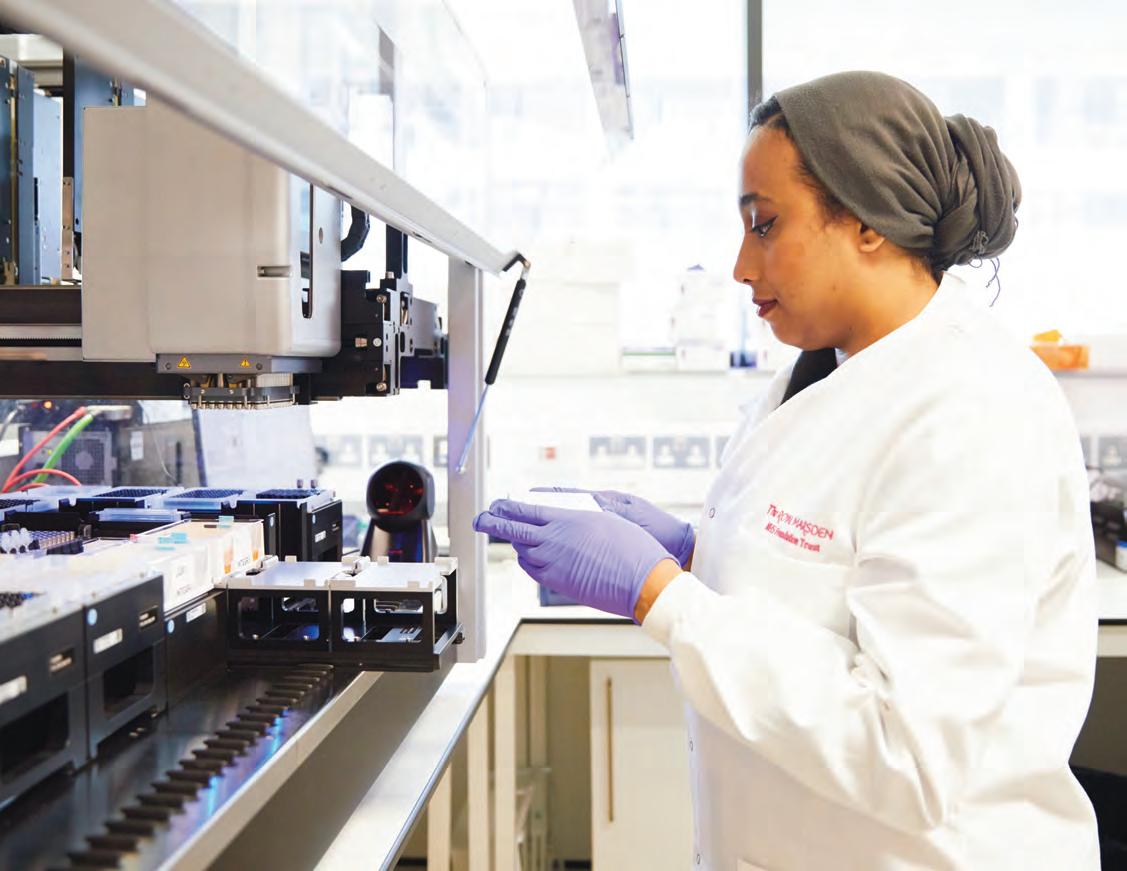
“We are exploring earlier detection of returning cancers”
more than 10 years later and living quite normal lives during that time. The ability to find and target the driver of the cancer makes a fundamental difference to patient outcomes.
The genomics can be divided into two parts. There are the changes that are just found in the tumour – we call these somatic changes. Then there are those that are inherited – one in six cancers has an inherited cause. These are important to find because many of the newer drugs are specifically aimed at those with inherited forms of cancer.
Finding inherited forms of cancer also presents the opportunity for prevention in family members – if we can find relatives carrying the same
gene mutation then we can prevent them from developing the same cancer using risk-reducing interventions or appropriate screening. As most of these genes can cause more than one type of cancer, we also have the chance to intervene and prevent other cancers from occurring.
My second specialty involves gynaecological cancers, and I frequently see patients with these conditions to discuss necessary tumour testing, including visitors from overseas who haven’t had such tests routinely. Decisions on the type of treatment required – such as chemotherapy or immunotherapy – increasingly rely on these tests.
Patients often visit us from abroad because such tests are not offered locally. Occasionally there are

treatments that aren’t available in other countries that potentially can be started with us at The Royal Marsden, and we can then work with the patient’s local team to continue the treatment when they return home.
Looking ahead, we are exploring earlier detection of returning cancers in those who have completed treatment. At present, such patients have lots of follow-up scans to make sure that their cancer isn’t returning.
In patients where breast cancer has come back, for example, it takes 10 to 12 months before we can detect this on a scan. We are looking at various tumour types using liquid biopsies to try and detect very small amounts of tumour cells in the blood much sooner.
I think we’ll be looking at how we can use this more widely in the future to detect cancer at very early stages. This will also be much easier for patients, who will be able to have a blood test every six months, rather than the inconvenience of regular scans.
We are also investigating how we can use blood tests to monitor people considered at high risk of developing cancer and pick up any issues at an early stage, giving us the best chance of curing them. For the types of tumours that currently don’t have many treatment options we are working with pharmaceutical companies to develop more effective drug treatments.
I run a number of clinical trials exploring molecular sequencing and helping to determine the best treatments for patients on the basis of their molecular changes. I’m also running a large study looking at patients with endometriosis, which is an increasing risk factor in a number of cancers, particularly ovarian and endometrial cancer. We’d like to be able to predict endometriosis patients who are at risk of developing cancer.
In addition, I’m involved in setting up screening programmes for patients with inherited gene syndromes, looking for the most effective ways to detect cancer at an early stage. The key is to identify problems as soon as possible, to give the best chance of successful treatment.
3 Dr George is also a specialist in gynaecological cancers and frequently meets patients requiring tumour testing that isn't available in their home countries (PHOTO: THE ROYAL MARSDEN)
For more information about The Royal Marsden Private Care or to refer a patient, please:
Visit: www.royalmarsden.nhs.uk/ private
Email: int@rmh.nhs.uk
Call: +44 (0)20 7808 2063

Kensington’s Cromwell Hospital offers a wide range of services for both men and women, building on more than four decades of healthcare provision
Since 1981, Cromwell Hospital has been delivering exceptional care from our state-of-the-art facility in Kensington, London. Over the years, we have consistently innovated and enhanced healthcare delivery and now offer some of the most advanced treatments and facilities for patients’ healthcare needs.
Our dedication to patient care is reflected in our achievement as the highest-rated hospital in the UK for the Patient-Led Assessments of the Care Environment (PLACE) – an independent evaluation that measures how well the hospital environment supports the delivery of clinical care.
We are pleased to serve the needs of patients across London and the world with a comprehensive, expert-led range of services for men and women.
At Cromwell Hospital, our gynaecologists are dedicated to providing exceptional care for women of all ages. The London Centre for Gynaecology Care, our outpatient department, is located in a quiet, welcoming area of the hospital where women can feel relaxed and confident in their care.
Here, we provide a range of diagnostic procedures, including a consultantled ultrasound service to support
conditions such as endometriosis and menopause. Patients can also receive outpatient treatments, including the MonaLisa Touch® – a hormone-free treatment for vaginal atrophy – that takes just an hour to complete.
With patients waiting on average seven years for an endometriosis diagnosis, the International Centre for Endometriosis at Cromwell Hospital provides rapid access to diagnosis and treatment.The Centre is number one in the UK for performing the highest volume of complex endometriosis operations.
Led by Mr Amer Raza, one of the UK’s most renowned endometriosis experts, our Centre provides a comprehensive range of services for both women and adolescent girls, from initial consultations and diagnostic tests through to treatment options. Eligible patients can benefit from laparoscopic surgery, which can often improve recovery times and reduce pain.
We recognise that endometriosis can have a severe impact on quality of life in young women, such as missing school, sports and social activities with their friends. Therefore, we are pleased to provide specialist support for young patients aged 13 to 18, led by gynaecologist Miss Maya Al-Memar in our young people’s department.
Dissatisfied with the treatment options that were available for her endometriosis, patient Lily Hansen sought care at Cromwell Hospital and underwent laparoscopic surgery. She says of her experience: “The care I received was of a high standard and all the staff, from Mr Raza to the anaesthesiologist and nurses, were all very supportive and friendly. They took the time to explain each step and keep things light-hearted. I felt seen and cared for, which is sometimes lost in the medical field.”
With one in seven women in the UK affected by breast cancer, we understand the importance of having

rapid and seamless access to care.
That’s why we provide a one-stop breast clinic across all three of our London sites – Cromwell Hospital, Basinghall Clinic and London Medical – making swift access to care even easier.
Our one-stop clinic enables patients to see a consultant and have all scans, tests and a biopsy (if needed) on the same day, all under one roof. Patients who receive a breast cancer diagnosis can access our awardwinning Integrated Cancer Campus at Cromwell Hospital, which boasts some of the most advanced treatments and state-of-the-art facilities in London. Here, our consultants use leading technology such as Vinehealth, a cancer companion app, to maintain a direct line of communication with patients for a personalised experience. 1

1-2 Cromwell Hospital provides a comprehensive range of services for both men and women (PHOTOS: CROMWELL HOSPITAL) 2
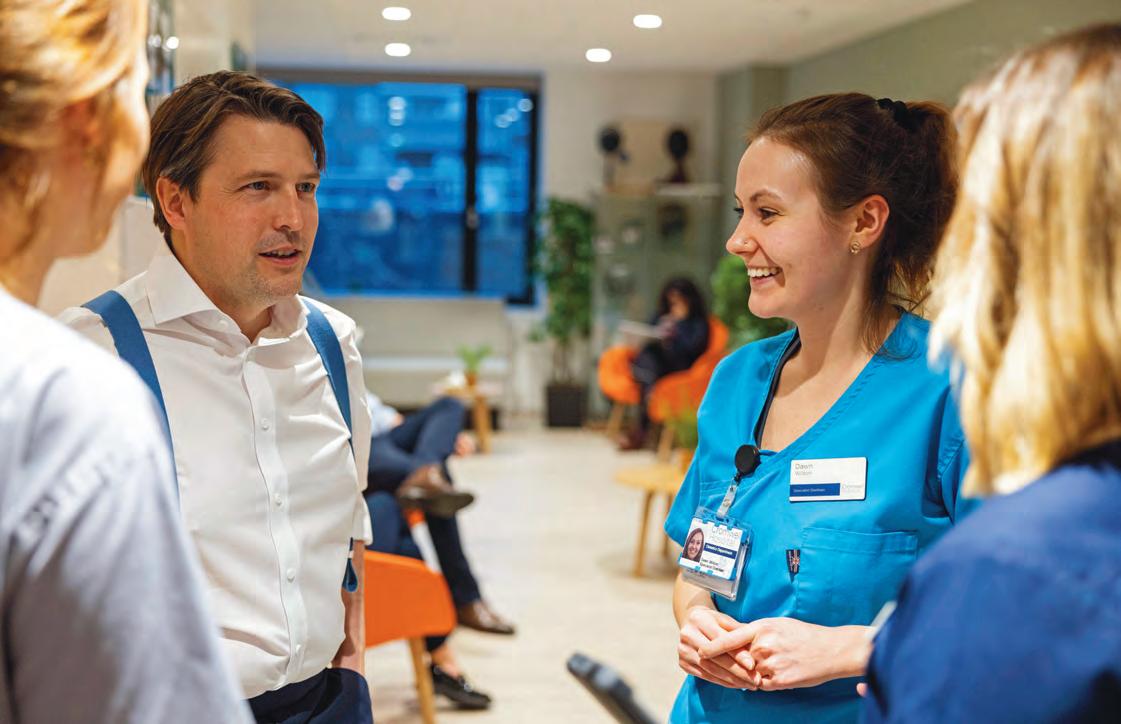
“We are proud to invest in the very latest robotic equipment”
Our urology service provides swift, thorough investigations for a range of common men’s health concerns, including blood in the urine, kidney stones, erectile dysfunction and incontinence. Patients can benefit from next-day appointments with leading urologists and access to specialist diagnostics, including multiparametric prostate MRI, bladder scanning, and flow rate measurements.
Around one in eight men in the UK will be diagnosed with prostate cancer, and, with prompt diagnosis and treatment, most cases will have a positive outcome. Entry to our dedicated prostate pathway begins with an abnormal prostate-specific antigen test at a routine GP appointment, and takes patients through the best diagnosis and treatment options for their situation.
Following a pre-clinic call with a specialist nurse, patients will be able to have a consultation with a urologist,
multi-parametric MRI scan and any other diagnostics all on the same day. For patients diagnosed with prostate cancer, their case will be discussed at a multidisciplinary team (MDT) meeting and a follow-up consultation will be held to discuss their options.
In 2023, 100% of prostate cancer patients at Cromwell Hospital who required an MRI had their results discussed with a consultant urologist on the same day. Additionally, 100% of eligible prostate cancer patients were offered a biopsy within five days; 100% of patients diagnosed with cancer were discussed in an MDT; and 100% of patients offered treatment within 31 days of diagnosis.
The symptoms of an enlarged prostate can be a source of frustration and embarrassment for many men, particularly those aged over 50. However, when it comes to treatment, many worry that the procedures offered will have unwelcome side effects, such
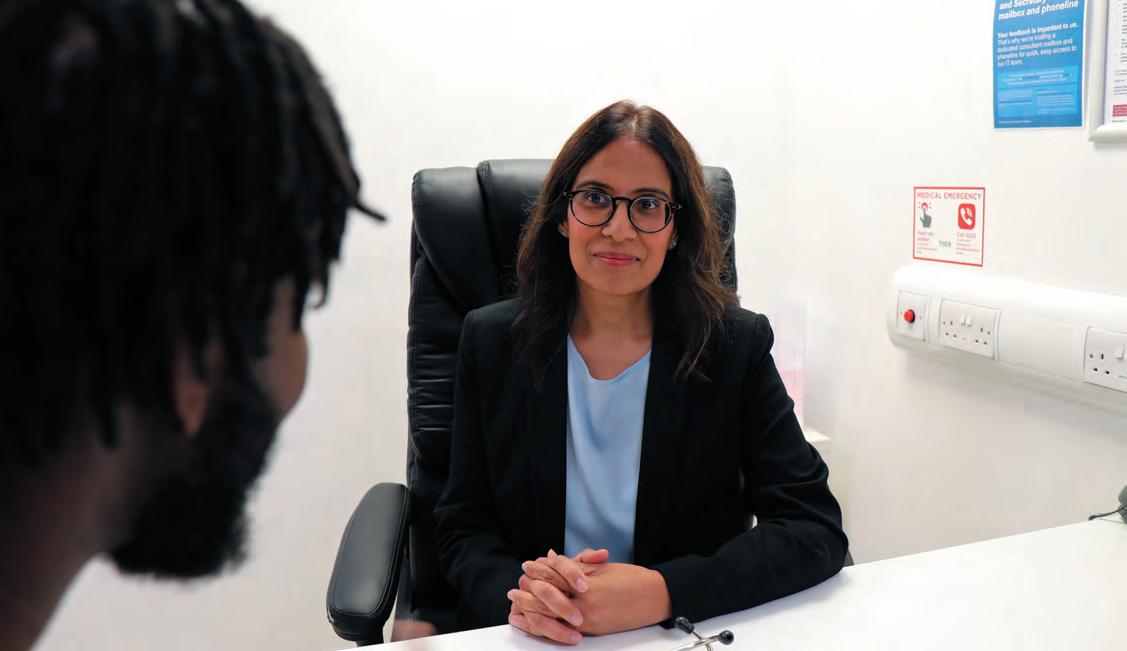
as sexual dysfunction. Cromwell Hospital is pleased to provide a comprehensive range of solutions to suit all cases, including Aquablation therapy.
Aquablation therapy at Cromwell Hospital is led by urologist Mr Neil Barber, who was responsible for introducing the procedure – among others – to the UK. The treatment is unique in that it uses a heat-free water jet to ablate obstructive prostate tissues, which provides effective, long-lasting relief and drastically lowers the risk of complications.
The Integrated Cancer Campus is a leading London facility for comprehensive cancer care. In partnership with GenesisCare, we are home to one of Europe’s most advanced radiotherapy centres, which utilises state-of-the-art technology including the Varian Edge, Gamma Knife Icon and MRIdian MR Linac.
Our recently refurbished Chemotherapy Day Unit is situated in a bright, serene area of the hospital, which was purposely designed to promote
relaxation and recovery. In 2025, we were awarded the Macmillan Quality Environment Mark (MQEM) in recognition of going above and beyond for people with cancer. All patient cases will be reviewed and discussed at MDT meetings to determine the appropriate course of action.
As a hospital at the forefront of innovation, we are proud to invest in the very latest robotic equipment for the benefit of both consultants and patients. This includes the da Vinci Xi and the da Vinci SP, which are used to carry out minimally invasive gynaecological and urological surgeries among others.
There are many benefits for patients who undergo robotic surgery, including improved recovery times, less pain, and less scarring. “The accuracy and precision of the da Vinci system works really well for keyhole procedures, such as hysterectomies and complex endometriosis. Using the da Vinci systems means our patients can leave hospital and recover more quickly,” explains Mr Amer Raza, consultant gynaecologist at Cromwell Hospital.
3-4 Each of Cromwell Hospital's specialists are leaders in their fields, providing world-class treatment and care (PHOTOS: CROMWELL HOSPITAL)
To find out more about men's and women's health at Cromwell Hospital or to book an appointment, call: +44 (0)20 7244 4886 (self-pay), +44 (0)20 7460 5700 (insurance) or visit: cromwellhospital.com/ womenshealth cromwellhospital.com/ menshealth










Two of OneWelbeck’s leading consultants talk about the unique nature of the hospital’s innovative Urology and Men’s Health Centre
Since its inception, the Urology and Men’s Health Centre at OneWelbeck has developed into one of the leading day-case and outpatient urology clinics in London. Formed by leaders in the field, the dedicated centre provides world-class support and care for patients over the entire course of their journey, from initial consultation to clinical nurse specialist (CNS)-led follow-up.
O ering a one-stop benign prostatic hyperplasia (BPH) service, rapid diagnostics across all areas of
urology, andrology and reproductive health and advanced treatments, the centre delivers world-class care and an elevated patient experience.
Discussing the centre’s unique set-up and service model, Professor Asif Muneer, consultant urological surgeon and andrologist, and professor of urology and surgical andrology at UCL, and Mr Neil Barber, consultant urological surgeon, share the reasons why OneWelbeck is London’s leading day-case and outpatient urology clinic.
How was OneWelbeck’s Urology and Men’s Health Centre formed?
Mr Neil Barber (NB): We’ve been gradually assembling an ever-growing group of urologists with a span of subspecialisation. Modern surgery and care methods are all about the collaboration of subspecialists. The concept behind the centre was to build a large multispeciality team that provides high-quality investigations and advanced treatments for all urological conditions under one roof. As consultants, the ability to use our experience and knowledge to shape the service means we’re able to build an exceptional o ering that facilitates an unmatched quality of care and patient experience.
What conditions are treated within the centre?
Professor Asif Muneer (AM): We run a dedicated men’s health and andrology service where we see patients experiencing problems with anything to do with the penis and scrotum, particularly erectile disfunction, male infertility, penile curvature, foreskin problems and low testosterone. This team is part of a wider urology group, which allows us to deliver diagnostics and treatment for the entire spectrum of conditions and health issues in the field of urology. So, while the focus is on providing care for male fertility, erectile function and andrology-related issues in our Men’s Health Centre, we’re able to seamlessly cross-refer patients with other urological issues to our specialist colleagues within OneWelbeck, and vice versa, for expedited, hassle-free care.
What sets OneWelbeck’s services apart from other private health facilities?
AM: It’s a fairly novel concept that at OneWelbeck we have a pure day-case facility, where we conduct outpatient surgery and diagnostics for male fertility, penile problems and andrology patients. In addition to this, our diagnostics, including imaging and blood tests, all take place in-house. We’ve got an exceptional imaging department with multiple CT and MRI machines, giving us the advantage of rapid diagnostics for patients. If a patient then needs surgery, that can take place in the same facility too. With everything under one roof, we’re able to o er our patients unrivalled access to the fast and e cient care they need and deserve.

How do the sta and facilities enhance a patient’s time spent at OneWelbeck?
NB: When you come to OneWelbeck, there’s a joy that you feel from our sta at all levels, and I think the patients recognise and appreciate that. There’s no doubt as well that the surroundings are wonderful – when many patients arrive, they remark that we work in such a wonderful setting. One of the joys of our department being on the sixth floor is that on a sunny day, when the balcony doors are open, it’s an extremely pleasant, relaxing place to be.
How do patients access care at OneWelbeck?
AM: Patients come to see us from all over the world, not just London, and in various ways – they may have been recommended by a friend or family member, they might be referred by their GP or another clinician they’ve seen, or some simply find us online.



To learn more about our services or to refer a patient, please call +44 (0)20 3653 2000 or visit onewelbeck.com 1 2
Many patients also come to the Urology and Men’s Health Centre because of a referral from a OneWelbeck colleague in another department. That’s another of the many benefits of having multiple specialties under one roof – sometimes, an issue is identified by another clinician and, as the patient is already within our single system, they can be referred quickly and easily, without the hassle of re-registering. This gives our patients a continuity of care that simply isn’t provided by other private hospitals and clinics at present.
1 Professor Asif Muneer, consultant urological surgeon and andrologist, and professor of urology and surgical andrology at UCL / 2 Mr Neil Barber, consultant urological surgeon (PHOTOS: ONEWELBECK)














The specialist diabetes team at London Medical provides the latest in personalised care, with support for patients throughout their diagnosis and treatment
London Medical is the UK’s leading private provider of specialist diabetes care, delivered by a team of worldclass experts. It is our mission to provide the latest treatment and technology, tailored to each individual patient. That means taking the time to listen to you and partnering with you on every step of the journey.
Our team of consultants, dietitians and diabetes-specialist nurses provide patients with personalised care for prediabetes, type 1 and type 2 diabetes, and obesity. London Medical is committed to providing care and support for the whole family.
Expert multidisciplinary
1 London Medical treats not only diabetes, but also related conditions (PHOTO: LONDON MEDICAL)
“We understand that a diagnosis can be life-changing, but our team is here to support you and improve your health, whatever stage of your journey,” says Dr Ralph Abraham, clinical lead for diabetes at London Medical and one of the UK’s
most experienced and highly regarded consultants in diabetes, endocrinology and cholesterol management.
Having all the required experts on-site –and working together – makes London Medical unique, not only addressing diabetes, but also for related changes in the eyes, kidneys, heart, feet, nerves, liver health, blood pressure and cholesterol, all of which require careful monitoring and treatment.
Type 1 diabetes treatments are currently dominated by the success of closedloop hybrid technology with online continuous glucose support, and in 2023-24 our team had one of the largest cohorts of such pump starts with the Omnipod 5. With careful selection and education, and with the right consultant, we can also offer insulinsparing medications to assist control and weight loss in appropriate patients.
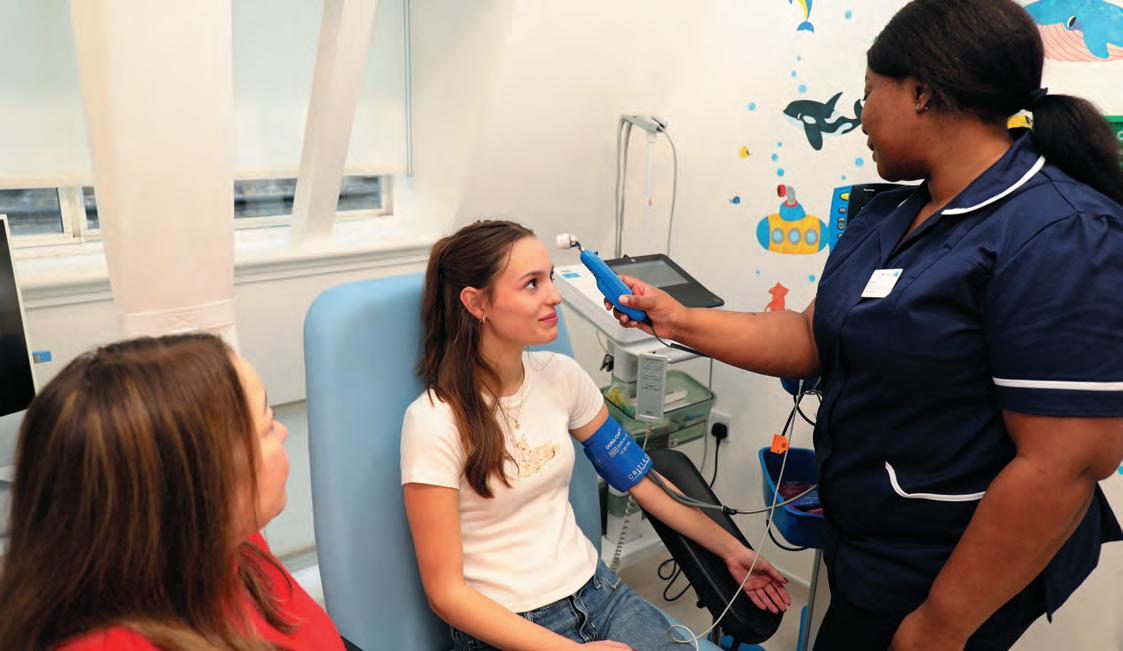
We now believe that a patient with type 1 diabetes, with support, can achieve time in range above 80% without hypoglycaemias, so that they can continue to live their diabetes their way with less stress.
Our Diabetes Connect service enables any patient with diabetes to access regular ongoing education and support for their care.
In England, 38% of adults are overweight – a condition that comes with an increased risk of developing type 2 diabetes, heart disease, stroke, high blood pressure, fatty liver disease, gout, kidney disease and some cancers.
Reaching and staying at a healthy weight can help prevent these problems, stop them from getting worse, or even make them go away.
Dr Abraham explains: “Obesity is an epidemic in the UK and internationally. We understand that losing weight can be difficult, which is why we provide a number of options including a
personalised weight-management programme, with support from our in-house dietitians and medication. Bariatric surgery can also be an important alternative for severe obesity.”
London Medical recognises that being overweight with diabetes is about more than glucose; it has a wider impact on your health and requires a specialist approach.
“The advent of drugs that are powerful in controlling blood glucose while also offering substantial weight loss enables us to also treat the metabolic health consequences of an increased waist circumference,” says Dr Abraham. “Few clinics treat metabolic obesity and diabetes as intensively as ours.”
London Medical can also provide access to support for cholesterol management, cardiac and vascular care, ophthalmology, obesity, sleep apnoea, and liver and kidney health to name a few. As Dr Abraham recognises, “navigating type 2 diabetes can feel like a minefield. We want to ensure our patients get the best care possible under one roof.”
“We want to ensure our patients get the best longterm care possible under one roof”
To find out more about diabetes care at London Medical or to book an appointment: Call: +44 (0)800 048 333
Visit: londondiabetes.co.uk
Orthopaedic surgeon
Professor Nima Heidari talks about how The London Clinic assists patients with diabetesrelated ankle, foot and lower-limb complications
What is your role at The London Clinic?
I'm an orthopaedic surgeon at The London Clinic and my area of interest is the foot and ankle, and a discipline of orthopedics called limb reconstruction. My experience includes setting up the foot and ankle unit at the Royal London Hospital. I also have a great interest in teaching – I've been chairing the AO advanced foot course in the UK and also the AO Masters course in Davos for the past few years.
Limb reconstruction is a discipline in which you deal with complications as a result of previous orthopaedic treatment or injury. Complications that can occur include deformities, failure of fracture fixation, deep infection and soft tissue loss.
What sort of issues can diabetic patients experience in their feet, ankles and lower limbs?
Diabetes is a very complex condition that affects almost all organs of the body. Patients can have problems with their eyes, their kidneys and they can suffer early narrowing of the arteries that can cause problems with the heart. It can be an antecedent to having strokes, and it can reduce blood supply to the foot, ankle and the lower part of the leg. Diabetes patients are also more prone to fractures, which are much slower to heal than normal. Skin wounds also take time to heal because of the lack of blood supply, increasing the risk of infection.
Diabetes also affects the nerves, meaning you can then lose what is described as ‘the gift of pain’, because
pain is protective. In the absence of that protective mechanism, injuries can mount up in the foot and long-term consequences can result. For example, the foot may start changing shape, such that skin in areas that are not used to bearing load ulcerate. Such infections can go to the bone and become complicated. Of the diabetes patients that have had a major amputation, the vast majority have had an antecedent event such as a small ulcer.
If diabetic patients are unable to exercise then controlling their condition may become more difficult. Therefore, preservation of the limb is extremely important for the long-term health, and that is essentially the aim of the treatment of diabetic foot problems.
How do you and your colleagues work together in trying to preserve a limb? We take a multidisciplinary approach to care, meaning that it is not just an orthopaedic surgeon like me who is involved. From the outset, our team includes a diabetologist to optimise sugar control, which is a critical starting point for treatment. As the vast majority of patients experience kidney problems, a nephrologist (kidney specialist) is also involved. Vascular surgeons are important for performing procedures to improve the blood supply to the foot.
Constant communication and coordination are really important on the nursing side, particularly in dealing with wounds. We discuss the best treatment strategy for diabetic infections with microbiologists.
After patients have had their surgery, they invariably require a short period of time in intensive care. At The London Clinic, we have a phenomenally well-organised intensive care unit, run by intensivists who also work at University College London Hospital.
The coordination of this level of care is quite complex, and in the private sector there are few places with the environment to enable this. Without the input of my colleagues, it would be impossible to look after such patients. In private practice, I don't know any other hospital that looks after such patients as we do at The London Clinic.

Do you receive many patients from abroad? If so, what can international patients expert when visiting The London Clinic for treatment? Many patients come to us from the Middle East, where they may have already received some treatment. However, finding consultants and surgeons with the necessary experience or interest in diabetic limb preservation is rare, so patients usually haven’t received expert care before they visit us.
For international patients, contact: E: internationaloffice@ thelondonclinic.co.uk 1
For our international patients, the medical treatment is only part of the story. The London Clinic has a wonderful international team to help patients navigate the complexities of their treatment while being away from home, including language assistance and consideration of cultural differences. Their valuable assistance ensures a smooth experience for both our patients and our medical team.
To learn more about The London Clinic, visit thelondonclinic.co.uk or contact: T: +44 (0) 20 4527 8215 E: appointments@ thelondonclinic.co.uk
Lucas Najún Dubos
MD MSc MBA , Healthcare and Life Sciences Partner at
Globant, considers the current and future benefits for patients as London’s healthcare providers increase their use of AI technologies
Artificial intelligence (AI) has been making waves around the world for its potential to revolutionise every aspect of both life and work. From speeding up tasks through automation to enabling the accurate analysis of vast amounts of data, the technology is fast proving its value. The healthcare sector is already harnessing AI, with providers starting to adopt it to deliver both better outcomes and a positive experience for patients.
Healthcare leaders are interested in tapping into the technology to take advantage of the potential it offers in areas such as diagnosis and treatment, intelligent proactive care, remote patient monitoring, drug discovery and care-associated administrative tasks. For example, AI tools can automate tasks such as scheduling, billing and claims processing, freeing up healthcare professionals to focus on crucial patient care. When it comes to diagnosis and treatment, AI is
considered groundbreaking because its algorithms can analyse medical images such as x-rays and CT scans with high accuracy, offering the potential for more precise and earlier disease detection – something that is vital to improving outcomes for patients with diseases such as cancer.
The technology’s analysis of patient data – such as genetics, medical history and lifestyle – offers medical teams the ability to predict individual responses to therapies, so they can personalise treatment plans, optimise outcomes and reduce potential side effects.
London looks to AI
As a major destination for international medical tourism, London is well positioned to harness the opportunities offered by AI in a way that benefits the thousands of patients from around the world who choose the UK’s capital for healthcare and treatment.

The technology is particularly well suited to this market because it provides a new level of convenience, enabling patients to be remotely monitored and a greater part of their medical journey – such as x-rays and post-operative rehab – to be managed in their home country. They get access to London’s world-class specialists and facilities throughout their treatment, but only need to visit the capital for key in-person elements such as immediate pre-operative assessment and the surgical procedure itself.
AI in action
AI adoption within London’s healthcare settings is in its initial and developing stages, with significant potential demonstrated in numerous pilots and roll-outs, paving the way for deeper integration into the healthcare system. For example, NHS North East London is implementing AI-guided clinical coaching aimed at easing pressure on urgent and emergency care services.
Barts Health NHS Trust reported in March 2025 that about 40 different AI applications were being used in its hospitals for tasks as varied as reducing the administrative burden, improving operational efficiency and analysing data and images to enhance clinical decision making.
The trust is trialling an online historytaking software in emergency care to identify high-risk patients, while its radiologists are using an AI tool to analyse chest x-rays, helping them to prioritise the most urgent cases. It is also piloting an application that scans blood film images to indicate the risk of leukaemia.
Other trials at the trust include the use of AI by podiatrists to identify diabetic foot disease, and a respiratory team that is using the technology to analyse NHS data to identify patients at risk of lung cancer.
“London is well positioned to harness the opportunities offered by AI”
1 The increasing use of AI tools for analysis of scans and x-rays is helping to identify health issues with greatere effect and efficiency (PHOTO: GORONDENKOFF/SHUTTERSTOCK)
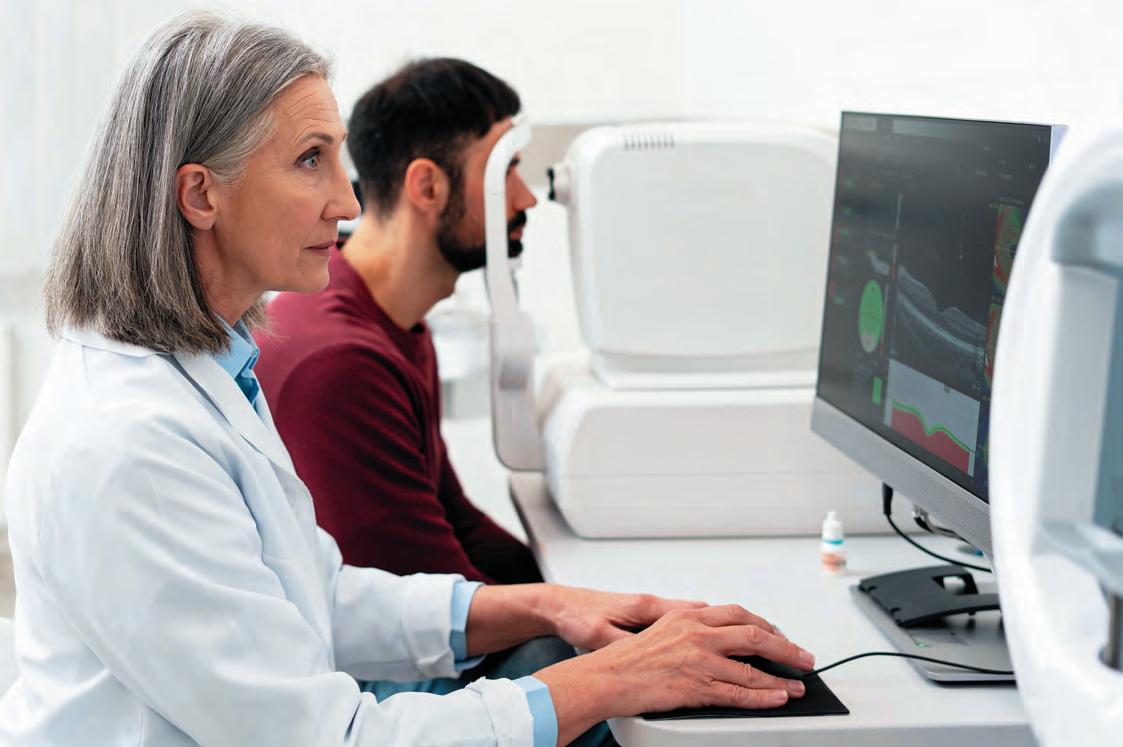
“The breadth of AI projects in London highlights the prospects for further development”
Patients at private healthcare provider HCA Healthcare UK have access to an AI-powered medical imaging solution that assesses the risk of a serious heart condition or heart attack – many years before symptoms appear. The software quantifies coronary inflammation and characterising plaque based on routine coronary CT angiography (CCTA).
A research team at Moorfields Eye Hospital and the UCL Institute of Ophthalmology has been involved in groundbreaking work using eye scans and AI to identify markers that indicate the presence of Parkinson’s disease in patients on average seven years before clinical presentation. This is the first time that anyone has been able to show these indicators so far ahead of diagnosis.
confined only to hospitals and medical applications. NHS South East London Integrated Care Board has introduced the technology to reduce the average wait time for patients to register with a GP practice from days to hours.
The breadth of AI projects in London highlights the prospects for further development and roll-out across the capital – if some of the challenges can be overcome. Key growth areas include improving digital and data infrastructure and fostering trust in AI tools, with both being essential for unlocking scalability and ensuring transformative impact.
2 New eye-scanning technology is one way in which AI is enabling many diseases to be identified before symptom develop (PHOTO: AYO PRODUCTION/SHUTTERSTOCK)
The Royal National Orthopaedic Hospital (RNOH) is applying AI to the assessment of bone health, with a tool that measures bone mineral density (BMD) from conventional digital x-rays. Meanwhile, the use of AI isn’t being
One area of focus is the need for suitable governance structures and support to ensure that the technology is deployed in a fair and principled way. Progress in this area includes the NHS South East London Integrated Care Board’s March 2025 launch of an AI framework to deliver safe and ethical pathways to enable the effective use of AI tools.
Another area of concern for those constructing AI solutions for deployment in London’s healthcare sector is ensuring that bias is not unintentionally built into such tools and applications. Avoiding this is vital to ensuring that all patients have access to the same level of care and diagnostic support, regardless of their ethnicity, gender or socioeconomic background.
Other challenges include securing sustainable funding, building the necessary digital infrastructure and ensuring that staff have the knowledge and capacity to engage with new technologies. This last challenge is considerable, with a survey by healthcare AI research and development company Corti and YouGov revealing that less than one in four UK healthcare professionals say they feel comfortable with their ability to use AI tools, while 35% admit that they are unaware of how the technology could be applied to their work.
AI adoption is considered to still be at an early stage in the UK’s healthcare sector, something that is borne out by the Corti/YouGov research, which revealed that the majority of the UK’s healthcare professionals are not using AI at work – and 73% have never done so. Consequently, there are many opportunities both to broaden and deepen the use of the technology across London and the rest of the UK.
While initiatives are being developed to address the barriers to AI deployment, the appetite for the technology is growing. In July 2024, think tank The Health Foundation found that more than half of the UK public (54%) and threequarters of NHS staff (76%) supported the use of AI to help with patient care, while an even greater proportion said they supported the use of the technology for administrative purposes (61% of the public and 81% of NHS staff surveyed).
The growing enthusiasm for AI shown by patients and medical practitioners has been matched by the UK government’s ambitions for the technology. In early 2025, it signalled its support through the AI Opportunities Action Plan,

a strategy to position the country as a leader in AI innovation. Wes Streeting, the UK’s Secretary of State for Health and Social Care, has also committed to the technology, saying that the NHS will “harness artificial intelligence to deliver faster and smarter care across the country”.
London is well positioned to match its world-class healthcare expertise with the latest AI techniques, as a March 2025 report from UCL Partners and The Health Foundation, AI in London Healthcare: the Reality behind the Hype, reveals: “With world-class medical institutions, top-tier universities and a thriving tech ecosystem, the city is at the forefront of innovation. Its rich, diverse, multimodal data resources could further help to advance AI development. By building a collective ecosystem for responsible AI integration, London’s healthcare system can lead the way globally in enhancing AI’s full potential to drive meaningful, system-wide transformation.”
3 AI applications are revolutionising the speed and accuracy of the infomation that can be gained from diagnostic scanning (PHOTO: PEAKSTOCK/SHUTTERSTOCK)
Globant creates digitallynative products that bridge the gap between businesses and consumers through technology and creativity.
For more details on Globant's innovations in the healthcare sector, see page 66 or visit www.globant.com/healthcare
The capital’s most accessible and advanced destination for world class healthcare, OneWelbeck is a specialist facility for minimally-invasive day surgery and outpatient diagnostics across nine floors in the heart of London. We empower teams of exceptional doctors, using the latest technology in dedicated centres of excellence, to deliver an effortless, personal and premium experience.
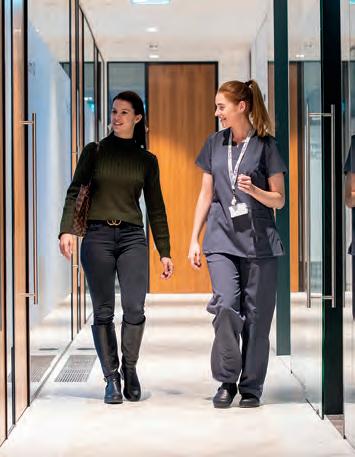
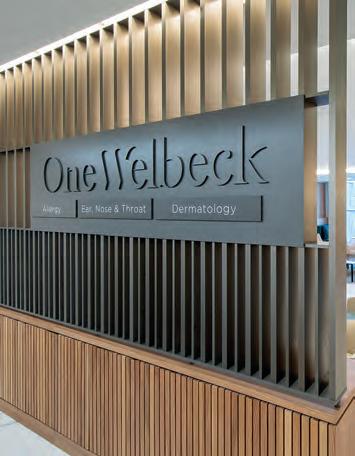
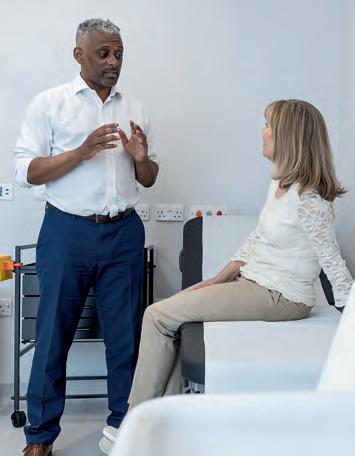
Our doctors are partners in the business and have a real influence in how it ’s run. They work together as teams to deliver personalised treatment and collaboratively solve the most complex healthcare challenges.
Our day clinic model not only reduces the time between a patient ’s first visit and their diagnosis and treatment, but also creates the very best clinical outcomes. The quality of patient care is at the heart of our approach, and all our methods are supported by robust evidence.
We use technology and innovative design to ensure a seamless, personal healthcare journey that doesn’t begin and end at the clinic doors. Our modern, stylish clinics provide patients with a warm and comfortable environment they’ll remember, and our enhanced pre- and after-care processes mean patients continue to receive advice and help before and once they’ve left the building.
Specialist Centres



Digestive Health
Allergy


London’s leading gastroenterologists offering the best in diagnostics and treatment alongside gold-standard bowel screening services.
Lung Health
We have 18 specialised departments which cover a full range of services, including but not limited to:
Respiratory centre of excellence providing consultation and testing, offering a range of services including full lung function testing and respiratory physiotherapy
Lung Health
Digestive Surgery
Skin prick testing • Patch testing • Blood testing • Desensitisation and immunotherapy • Food/drug provocation
Dermatology
Our experts in gastrointestinal and general surgery ensure patients receive a complete service, from consultation and testing through to surgical procedures and after-care.
3D Mole mapping • Skin cancer • Skin lesions • Phototherapy (eczema, psoriasis, vitiligo)
Ear, Nose & Throat
Digestive Health
Bowel screening • Renal • IBS and IBD diagnosis and management • Liver scanning
Custom-built outpatient and diagnostic suite for ear, nose, throat, and head and neck conditions including full audiology service.
Ear, Nose and Throat
Endocrinology
Audiology screening • Hearing aids • Nasal endoscopy • Rapid diagnosis of neck and face lumps
Specially tailored outpatient and diagnostic suite for endocrine conditions and diseases.
Endocrinology
Enhanced Breast Screening
Diabetes and pre-diabetes • Tiredness and chronic fatigue • PCOS • Osteoporosis and bone disorders
Endoscopy
Designed by leading radiologists to create a seamless patient experience, from consultation and screening through to results and follow-up care, all in a private and relaxed environment.
Dedicated four-room GI Endoscopy suite, featuring en-suite private rooms and advanced sedation
Heart Health

Orthopaedics & Sports Medicine
Persistent cough • Lung function testing • Lung cancer screening • Asthma & breathlessness • Long Covid
Men’s Health
A dedicated outpatient consulting and diagnostic clinic founded by leading orthopaedic and sports medicine ex perts, and equipped with the latest diagnostic innovations.
Kidney & bladder stones • Prostate cancer screening • Testicular cancer • Benign prostate conditions • Erectile dysfunction

Health Assessment & Longevity
Full executive screening • Corporate packages • Bespoke screening • Concierge GP service
Heart Health
Cardiology centre of excellence providing consultation and testing, offering a range of services including echocardiology and 24-hour ECG through to pacemaker and other device procedures.
Imaging & Diagnostics
Full cardiovascular diagnostic suite • Cardiac screening • Day case device implant and cardiac ablations
Imaging and Diagnostics
Designed in partnership with one of the world’s leading imaging manufacturers, GE Healthcare. It comprises of a 1.5T and 3T MRI scanners, lowest-dose CT, X-ray, standing CT, and rapid blood testing.
1.5T and 3T MRI, including pacemaker compatibility • CT • Ultrasound • DEXA • X-rays • Bloods & pathology • Standing CT

Rheumatology
Neurology
Migraines • Blackouts, seizures and epilepsy • Movement disorders and tremors • Pins and needles
Specialist team dedicated to treating multiple conditions such as rheumatoid arthritis and lupus.
Orthopaedics
Skin Health & Allergy
Foot & Ankle • Hip • Knee • Shoulder • Elbow • Hand & Wrist • Spine • Tendons • Rheumatology
Bringing together leading dermatologists and allergists to create a bespoke service, with testing and procedures all carried out in-house and often same-day.
Pain Medicine
Surgery Centre
Short & long term pain management • Non-surgical treatment • Pain injections
Sleep Centre
Our minimally invasive surgery centre boasts three theatres, and has been designed by our leading surgeons to ensure a calm and high quality experience with all private en-suite patient rooms.
At-home sleep testing • Snoring • Insomnia • Sleep apnoea • Tonsil and nasal disorders • Breathing disorders • Restless legs
Sports Medicine
Women’s Health & Gynaecology
Osteoarthritis • Tendon issues • Long term muscle injuries • Sports injuries
Specialist centre for female health and reproductive conditions, offering outpatient consultations, diagnostic tests, and minor outpatient procedures in a relaxed environment.
Surgery Centre
Multi-specialty, minimally-invasive day case surgical suite
Women’s Health
Menopause clinic • Breast screening • Fertility • Menstrual problems • Pelvic pain • Endometriosis
To learn more about our centres and how to refer patients, please contact us at:
Digitally native IT and software company
Globant is at the forefront of developing artificial intellgence solutions for the healthcare sector, advancing the use of cutting-edge technology to ensure an innovative approach to a healthier future
Globally, healthcare systems are navigating unprecedented challenges: escalating costs, rapidly ageing populations and a crucial shift towards more personalised patient care. Amid this complex landscape, Globant is making significant strides, contributing to solutions through its innovative applications of artificial intelligence (AI). In a world increasingly shaped by digital advancements, Globant is actively participating in the evolution of healthcare – from improving integration across diverse services and providers to facilitating the transition towards tailored treatments for individual patients.
Globant is driving this transformation by deeply embedding AI and intelligent systems into critical areas such as clinical research, hospital management and pharmaceutical operations. The tangible impact of these innovations is already clear:
For patients, they promise faster access to essential clinical trials and the development of safer, more seamless hospital experiences. For clinicians, these solutions offer invaluable time-saving tools, allowing them to dedicate more of their most valuable asset – time – to direct patient care and high-value tasks. For health systems, they provide robust, data-driven insights that are crucial for improving operational efficiency and achieving significant cost reductions.
For pharmaceutical companies, Globant's AI enables more targeted and effective operations across the entire drug development life cycle.
Globant's solutions are meticulously developed to address the inherent challenges and concerns associated

with transforming the sector with AI tools and applications. Their platforms prioritise interoperability, ensuring seamless integration with existing electronic health records, advanced imaging systems, laboratory services, wearable devices and comprehensive pharmaceutical databases.
Crucially, Globant's systems are also designed with robust safeguards to ensure strict compliance with privacy regulations, such as GDPR. Furthermore, they actively monitor for algorithmic bias, a vital step in ensuring fair and equitable outcomes across diverse patient populations. Recognising the human element, Globant also emphasises clinician training and the establishment of clear governance structures, both of which are central to fostering widespread adoption and building trust in new AI tools within healthcare settings.
Globant’s ambitions in healthcare received a significant boost in April 2023 with the strategic acquisition of Minneapolis-based consultancy ExperienceIT. This development not only substantially expanded Globant’s footprint in North America, but also enhanced its capabilities in digital transformation, particularly in areas such as IT modernisation and optimising the healthcare-provider experience. This acquisition has provided Globant with invaluable insights into the region’s health-tech ecosystem, better equipping it to support healthcare clients through their complex digital transitions.
The acquisition of Common MS in mid-2024 by Globant represents another highly strategic move with profound implications for the hospital sector across Europe, Latin America and the Middle East. Common MS's value in the
“Globant’s systems are designed with robust safeguards”
1 Globant’s AI solutions are playing an important role in advancing digital transformation in healthcare (IMAGE: GORODENKOFF/SHUTTERSTOCK)

“Globant will continue to develop robust solutions that support better outcomes”
healthcare realm is significantly amplified by its specialisation in developing and implementing the ECH Easy Healthcare system. This robust system, specifically designed for comprehensive hospital information management, has firmly established Common MS’s presence in key healthcare institutions throughout these regions.
the groundwork for more connected, efficient and truly personalised patient care. This operation underscores a compelling trend where technology acts as the primary catalyst for transforming and improving healthcare service delivery, offering novel tools to address both current and future challenges facing the sector.
Globant is also directly integrating its AI expertise into core hospital operations and clinical documentation processes. Solutions like Ambient Scribe, Automate Clinical Documentation and Clinical Coding are now integral parts of the Healthcare Suite, significantly boosted by Globant Enterprise AI. This company platform is specifically designed to help businesses seamlessly integrate and manage AI solutions, with a particular focus on Large Language Models (LLMs), all while ensuring robust security and essential flexibility. Essentially, it empowers organisations to harness the immense power of AI without the inherent complexity of directly managing the underlying AI models.
Innovation on demand:
Globant’s AI Pods and novel engagement models
2 Globant's AI-driven approach is making an impression in the pharmaceutical sector (IMAGE: TSVIPHOTO/SHUTTERSTOCK)
The integration of Common MS and its proven ECH Easy Healthcare solution into Globant not only considerably expands Globant’s service offerings, but also strategically positions it as a pivotal player in the ongoing modernisation of hospital technological infrastructure. At a time when digitalisation, operational efficiency and meticulous patient data management are more critical than ever for global healthcare systems, the synergy between Globant's innovative agility and Common MS’s in-depth knowledge of hospital information systems promises to accelerate the implementation of advanced technologies. This encompasses everything from optimising intricate clinical workflows to enhancing datadriven decision-making, thereby laying
In a landscape demanding both agility and groundbreaking solutions, Globant's ‘AI Pods’ represent a significant leap forward, not just in AI application, but fundamentally in how organisations engage with digital transformation. This pioneering subscription-based model offers on-demand access to highly specialised teams – comprising AI-powered engineering, design and product-development services – all expertly orchestrated and supervised by Globant's seasoned professionals. It signifies a fresh, flexible approach to securing top-tier AI talent and capabilities, moving beyond the traditional constraints of fixed-term, project-based contracts.
Why are these innovative engagement models particularly compelling for healthcare providers and pharmaceutical companies in the UK? They offer unparalleled flexibility and speed. Instead of enduring lengthy recruitment processes or grappling with fixed-scope projects that struggle to adapt to evolving needs, AI Pods provide a scalable, agile and continuous influx of innovation.

3
This empowers organisations to rapidly pilot new ideas, iterate on solutions, and scale successful initiatives without the inherent overheads and rigidities of conventional setups. The result is faster time-to-value and a heightened ability to remain competitive in a rapidly evolving technological landscape.
Consider the substantial impact these flexible AI Pods can drive across various critical areas: Accelerating drug discovery and clinical trials Imagine rapidly deploying an AI Pod to analyse vast genomic datasets for novel drug targets, or to optimise patient recruitment for clinical trials by accurately predicting ideal candidates, thereby significantly compressing crucial development timelines Enhancing personalised patient care An AI Pod could be tasked with developing intelligent systems that seamlessly integrate diverse patient data to predict disease progression, recommend highly tailored treatment plans or even create sophisticated AI-powered virtual assistants to support remote patient monitoring and engagement. Optimising healthcare operations From utilising AI to precisely predict bed availability and streamline resource allocation in hospitals,
to optimising complex supply chain logistics for essential medicines, AI Pods can quickly build and deploy tools that drive unprecedented operational efficiencies
By providing a flexible, expert-driven conduit for AI integration, these pods empower organisations to embrace artificial intelligence effectively, driving greater efficiency, fostering continuous innovation and, ultimately, helping to navigate the complex challenges of modern healthcare.
Looking ahead, Globant is exceptionally well-positioned not merely as a technology provider, but as a genuine long-term partner in shaping the future of healthcare. With a clear commitment to ethical innovation, unwavering interoperability and collaborative approaches, the company will continue to develop robust solutions that support better outcomes for patients, clinicians and health systems alike.
As digital transformation accelerates across the sector, Globant’s forwardthinking approach ensures it is set to play an increasingly important and influential role in making healthcare more intelligent, more accessible and truly adaptive to the diverse needs of tomorrow.

Globant creates digitallynative products that bridge the gap between businesses and consumers through technology and creativity.
For more information on Globant's innovations in the healthcare sector, visit www.globant.com/healthcare

London is steeped in history, yet the city is constantly reinventing itself – it’s a place where tradition meets innovation and the past meets the present. Nowhere is this more evident than in its extraordinary array of museums and galleries
Whether your passion lies in Earth’s natural wonders, the story of human innovation, Renaissance masterpieces or cutting-edge contemporary art, London’s cultural landscape is both vast and meticulously curated. The capital is home to many of the world’s most prestigious museums and galleries, where art, science and history converge in astonishing and inspiring spaces.
For visitors seeking a high-end, luxury experience, these renowned locations offer far more than a conventional day out. From private curator-led tours to exclusive viewings and architecturally iconic spaces, these venues provide immersive, intellectually rich experiences tailored to those who seek depth, beauty and refinement.
A prime example of London’s impressive selection of museums dates back to 1753. The British Museum houses one of the world’s most comprehensive collections of art and artefacts –over eight million objects spanning
continents and millennia – all displayed in an impressive building that has seen the addition of the soaring glass canopy of the Great Court, designed by Sir Norman Foster. The museum’s central Bloomsbury location places it within easy reach of many of London’s luxury hotels, making it a cultural cornerstone for elite travellers.
Highlights include the Rosetta Stone, the inscriptions on which unlocked the secrets of ancient Egypt; the Parthenon sculptures, evoking the grandeur of classical Athens; Assyrian reliefs, gleaming Roman silver, and enigmatic Mesoamerican deities. Each gallery offers a journey through time and across cultures, inviting reflection on the achievements and mysteries of humanity.
The art of living well
A tribute to elegance, innovation and craftsmanship, the Victoria and Albert Museum (V&A) is the world’s largest museum of applied and decorative

2

arts. Located in the heart of South Kensington, the V&A serves up a visual feast that celebrates the art of living beautifully across cultures and centuries.
Its collections span fashion, jewellery, sculpture, textiles, ceramics, interiors, photography and much more. Highlights include the resplendent Jewellery Gallery, featuring dazzling pieces from Mughal India to Cartier, and rotating exhibitions that frequently draw global acclaim – from haute couture retrospectives to design innovations.
2 Visitors to the Natural History Museum are greeted by a genuine 25-metre skeleton of a blue whale / 3 The Science Museum offers insights into innovations from the past and those that are set to shape our future (PHOTOS: STEFAN SUTKA; ANTON IVANOV/SHUTTERSTOCK)
Just a stone’s throw from the V&A, the Natural History Museum offers an entirely different, but equally awe-inspiring, experience that will delight anyone with an interest in science, conservation or the evolution of the planet. Housed in one of London’s most iconic buildings – a Romanesque masterpiece with cathedral-like arches – the museum is a sanctuary of natural beauty, scientific discovery and architectural splendour.
Dominating the museum’s central Hintze Hall is a breathtaking 25-metre blue whale skeleton suspended from the ceiling – a symbol of life on Earth and our place within it. The museum’s vast collections span dazzling gemstones, ancient fossils, interactive volcano displays and the ever-popular dinosaur gallery, home to an animatronic Tyrannosaurus Rex and rare prehistoric skeletons.
Adjacent to the Natural History Museum, the Science Museum completes South Kensington’s exceptional cultural trio with its celebration of the ingenuity, imagination and breakthroughs that have shaped human progress — from the Industrial Revolution to the frontiers of space and artificial intelligence. Its galleries offer a fascinating journey through the history of innovation. Standout exhibits include the Apollo 10 command capsule, early computing machines and interactive zones exploring robotics, flight, medicine and more.
While South Kensington’s museums celebrate the wonders of nature, design and human ingenuity, London’s art galleries offer a different kind of richness – a visual journey through centuries of creative brilliance. Among them, the National Gallery stands as one of the greatest in the world.
Located in Trafalgar Square, at the heart of historic London, the National Gallery houses a spellbinding collection of over 2,300 masterpieces from the 13th to the early 20th centuries. Visitors can immerse themselves in works by Leonardo da Vinci, Rembrandt, Velázquez, Monet and Van Gogh – all displayed within the beautiful architectural surroundings of a neoclassical building.
Whether visitors are aficionados of the Italian Renaissance or captivated by the emotion of Impressionism, the National Gallery offers the rare opportunity to engage deeply with the evolution of European art – all within walking distance of luxury hotels, fine dining and London’s vibrant West End. The gallery also offers bespoke experiences that elevate a visit far beyond the ordinary, including private curator-led tours that offer intimate encounters with legendary paintings,
Housed in a striking former power station on the South Bank, Tate Modern is as much an architectural marvel as a cultural beacon, celebrated worldwide for its daring exhibitions and dynamic public spaces. Its collection features giants of 20th- and 21st-century art, including Mark Rothko’s luminous canvases, Andy Warhol’s pop art and Ai Weiwei’s provocative installations.
Tate Modern embodies London’s spirit of innovation and global cultural dialogue, making it essential for those who appreciate the forefront of artistic expression within an unforgettable setting. Its vast Turbine Hall regularly hosts large-scale, immersive works that challenge and inspire, while smaller galleries offer intimate encounters with cuttingedge creativity. A stylish riverside restaurant and bar offer breathtaking

4
views of the Thames and St Paul’s Cathedral, perfect for relaxation or socialising after a day immersed in art.
The story of British art
Just a brief river cruise or taxi ride from Tate Modern lies its distinguished counterpart, Tate Britain – a sanctuary dedicated to the history and evolution of British art. While Tate Modern pulses with contemporary energy, Tate Britain offers a quieter, more contemplative experience, tracing over 500 years of artistic achievement from Tudor portraits to modern British masters.
Within its elegant galleries, visitors encounter iconic works by Turner, whose dramatic seascapes are a British national treasure, as well as masterpieces by Blake, Constable and Hockney –to name only a few. The collection tells the story of Britain’s cultural identity, reflecting social change, innovation and the country’s unique artistic voice.
Together, Tate Britain and Tate Modern offer a rich dual perspective on art – one deeply rooted in heritage, the other boldly global and contemporary – perfect for the culturally curious traveller seeking depth and diversityl.
“While Tate Modern pulses with contemporary energy, Tate Britain offers a quieter, more contemplative experience”
4 A former power station on the banks of the River Thames was put to innovative use to become the home for Tate Modern in 2000 (PHOTO: LENSCAP PHOTOGRAPHY/SHUTTERSTOCK)
Visitors to London can sample superb hospitality while experiencing some of the world's leading sporting and cultural events, many of which are within easy reach of the capital
Each summer, Britain unfurls a cultural and sporting calendar unlike any other – the British Social Season. From horse racing at Royal Ascot and tennis at Wimbledon to opera amid the manicured surroundings of Glyndebourne, this is where Britain showcases its heritage, elegance and love of spectacle.
For travellers seeking a truly luxurious experience, the Social Season presents a summer itinerary of champagne receptions, private enclosures and tailored hospitality. Whether your passion lies in sport, the arts or the grandeur of English gardens, there is an experience to stir every soul. Many of these high-quality events and occasions are within easy reach of London, while events further afield are ideally suited to those wishing to explore the country more widely.
No element of the British Social Season captures the marriage of heritage, sport and high society quite
like horse racing. For centuries, the racecourse has been a theatre not only for world-class equine competition, but also for refined elegance, sartorial splendour and social spectacle.
Royal Ascot stands at the pinnacle. Held in June, this five-day celebration of racing and regal glamour draws royalty, celebrities and international visitors to its famed enclosures. With its strict dress codes, extravagant millinery and ceremonial royal procession,
Royal Ascot is as much a fashion parade as a sporting event. The Royal Enclosure offers exclusive hospitality and private viewing areas, ideal for those seeking the ultimate VIP treatment.
The Derby Festival at Epsom, home to “the greatest flat race in the world”, precedes Royal Ascot at the start of June, delivering a more relaxed but equally storied atmosphere. Its long history of royal patronage continues to make it a cornerstone of the Social Season. July’s

Qatar Goodwood Festival, traditionally known as “Glorious Goodwood”, offers a perfect blend of laid-back charm and aristocratic flair. Set amid the rolling Sussex Downs, it is the epitome of English summertime elegance, with less formality than Ascot but no less exclusivity.
Britain’s summer sporting calendar would be incomplete without tournament golf. For those seeking a luxury experience, the 2026 season brings not only worldclass play, but also the opportunity to experience settings of quiet grandeur and impeccable hospitality.
North-west England will stage two of the biggest British golf tournaments in 2026. The challenging seaside links course of Royal Birkdale in Southport will play host to Open Championshipin July. A few weeks later, and a little further north along the same coastline, the AIG Women’s Open will mark its 50th staging at Royal Lytham & St Annes.
Nowhere is the British summer more perfectly expressed than on its legendary tennis courts. The centrepiece, of course, is Wimbledon – for two weeks each July, the All England Lawn Tennis Club becomes a global stage for sporting greatness and social sophistication.
In the run-up to Wimbledon, the Queen’s Club Championships in west London provide a more intimate, though no less distinguished, experience. Set within one of the capital’s most prestigious private clubs, Queen’s combines top-level tennis with an atmosphere of relaxed exclusivity.
While much of the British Social Season is defined by tradition and pageantry, it also has a thrilling edge – one that roars into life with the country’s worldclass motorsport events and elegant classic car gatherings. These are occasions where horsepower meets heritage, and where luxury unfolds
“Nowhere is the British summer more perfectly expressed than on its legendary tennis courts”
1 The summer sporting events of the Social Season offer luxurious hospitality packages that exude British ssyle and sophistication (PHOTO: NADA54/SHUTTERSTOCK)

2
“The Social Season finds one of its most graceful expressions in rowing and sailing events”
not just in champagne tents but on the tarmac and gravel of Britain’s most iconic circuits and estates.
At the forefront is Formula 1’s British Grand Prix at Silverstone, about 70 miles north of central London – a fixture that blends cutting-edge technology with deep-rooted racing history at the home of British motorsport. Premium hospitality suites offer trackside views, gourmet cuisine and access to exclusive paddock areas.
However, the Season isn’t only about contemporary speed – it’s also a celebration of timeless design and motoring heritage. The Goodwood Festival of Speed in mid-July, blends motorsport history, innovation and theatre. For those who favour elegance over velocity, Salon Privé at Blenheim Palace in late August provides a more refined automotive affair, where classic cars are displayed against the baroque splendour of one of England’s grandest stately homes.
in history, civility and a languid charm that makes it a natural part of the Social Season.The centrepiece of the summer is England’s Test series, which in 2026 will see the national team take on touring sides from New Zeland and Pakistan. Among the grounds that host Test matches are the capital’s two iconic cricket venues – Lord’s, the spiritual home of the game, and The Oval.
On Britain’s rivers and coasts, the Social Season finds one of its most graceful expressions in rowing and sailing events. Chief among them is the Henley Royal Regatta – for five days each July, Henley-on-Thames is transformed into a vision of English summer at its most refined, where rowers from around the world compete. Off the south coast, Cowes Week sees one of the longest-running and most prestigious regattas in the world. Held each August on the Isle of Wight, the event combines fiercely competitive yacht racing with a vibrant social calendar.
2 The Henley Regatta is the setting for top-class rowing amid a world of private marquees and chilled champagne, where etiquette is part of the charm (PHOTO: NORDWAND/SHUTTERSTOCK)
Cricket holds a special place in the British cultural imagination – not just as a sport, but as a social ritual, steeped
Equestrian events are woven deeply into the fabric of the British Social Season. Among the highlights are the
renowned horse trials at Badminton, Chatsworth, Burghley and Blenheim. Each of these events is a showcase of world-class three-day eventing, also offering a quintessentially British experience – grand manor houses, rolling parkland and the gentle bustle of well-dressed spectators.
The Royal Windsor Horse Show in May adds a regal touch to the Season, hosted in the shadow of Windsor Castle, located 25 miles from London. Combining show jumping, carriage driving and dressage, this event draws a distinguished crowd, including members of the Royal Family. Polo also features prominently during the Season, with fixtures at Windsor, London’s Hurlingham Club and Cowdray Park in West Sussex.
The British Social Season extends beyond sport, embracing arts and culture to offer a perfect complement to the summer’s athletic pursuits. At the heart of this cultural calendar is the Glyndebourne Opera Festival, which is set in the South Downs of East Sussex. Renowned for its impeccable productions and relaxed yet elegant atmosphere, Glyndebourne invites guests to enjoy performances of the highest calibre against the backdrop of a grand country house.
The more intimate Grange Park Opera, set within the grounds of Hampshire’s Grange estate, offers a similarly enchanting experience. With a focus on innovative productions and world-class talent, it provides a chance to savour opera amid serene parkland, where luxury hospitality blends seamlessly with outstanding musical artistry.
In London, the Season reaches a crescendo with the BBC Proms at the Royal Albert Hall – a celebration of classical music unmatched in scope and spirit. Spanning eight weeks, the Proms bring together renowned orchestras, soloists and conductors in a dazzling array of concerts, including the spectacular Last Night of the Proms in mid-September.
As summer unfolds, the British Social Season also celebrates the art of horticulture. For visitors seeking a

serene yet sophisticated experience, the nation’s premier flower shows provide a stunning showcase of creativity, colour and tradition, all set within exquisitely landscaped grounds.
The RHS Chelsea Flower Show in May is the pinnacle of this floral calendar, drawing garden designers, celebrities and enthusiasts from around the world. Held at London’s Royal Hospital Chelsea, the show is a dazzling display of innovation and elegance.
In July, the RHS Hampton Court Palace Flower Show offers a grand yet more relaxed counterpart. Set against the historic backdrop of the famous Tudor palace, this event combines horticultural excellence with a festive atmosphere. VIP packages provide private tours, expert talks, and elegant dining experiences amid the palace’s majestic surroundings.
“The nation’s premier flower shows provide a stunning showcase of creativity, colour and tradition”
3 Lovers of horticulture can experience best-in-class displays in hisoric surroundings (PHOTO: CHRIS GALKOWSKI/SHUTTERSTOCK)
Cromwell Hospital 14-17, 32-35, 50-53
Globant 60-63, 66-69
HCA Healthcare UK 10-13, 22-25
The London Clinic 28-31, 36-37, 42-45, 58-59
London Medical 26-27, 56-57
OneWelbeck 18-21, 54-55, 64-65
The Royal Marsden Private Care 38-41, 46-49
www.senatepublishing.co.uk
+44 (0) 20 7723 9825
info@senatepublishing.co.uk